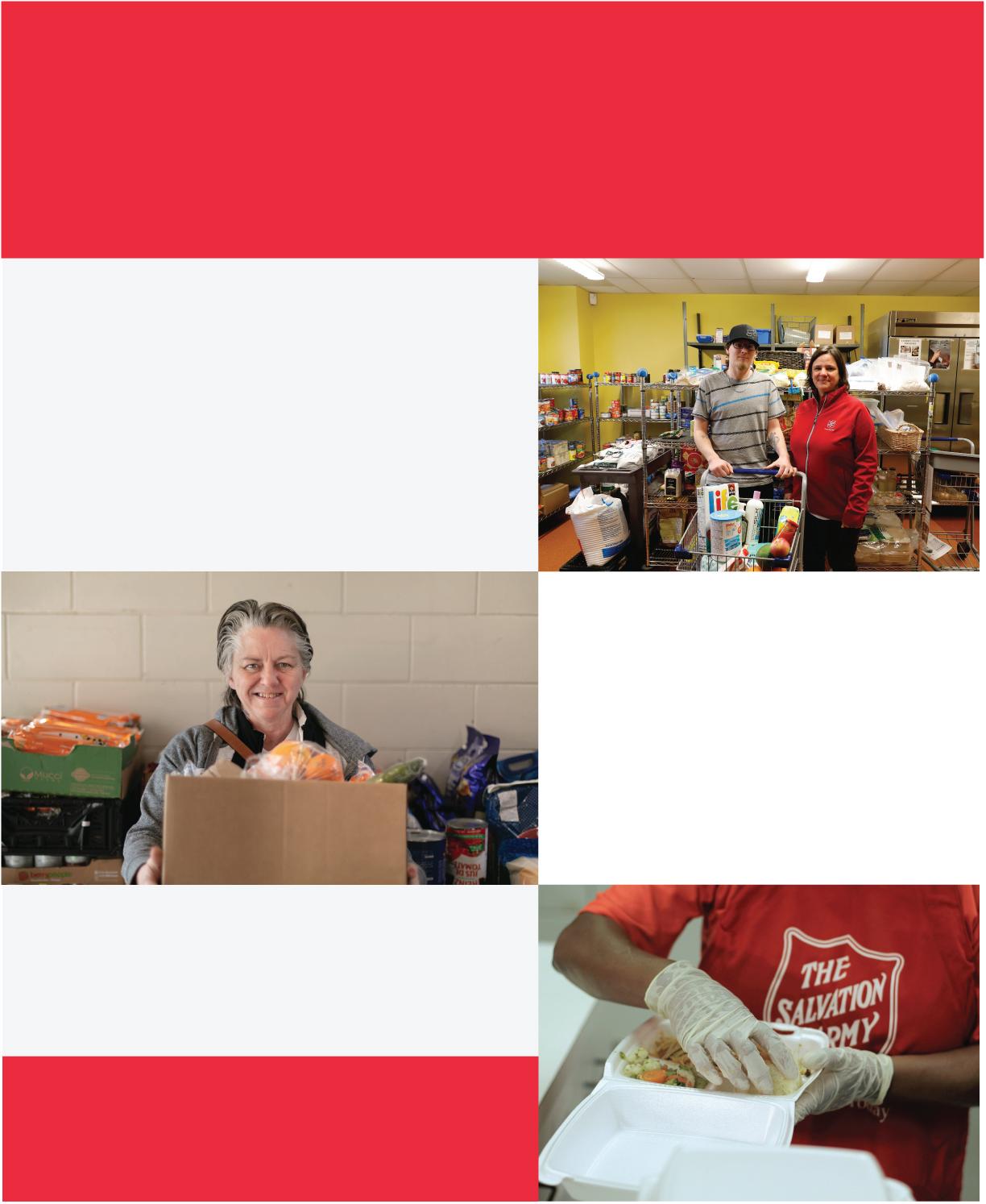May/June 2023
General Election: Inside a High Council
Why Become a Salvation Army Officer?
Meet the Reflectors of Holiness Cadets and Aux-Captains

THE VOICE OF THE ARMY

May/June 2023
General Election: Inside a High Council
Why Become a Salvation Army Officer?
Meet the Reflectors of Holiness Cadets and Aux-Captains

THE VOICE OF THE ARMY
Salvationist.ca

5 Frontlines
8 Inbox
20 Viewpoint
Living Under Orders by Major Ray Harris
25 A Sacramental Life
Called to Abide by Major Steven Cameron
26 Perspectives

Relentless Hope by Lt-Colonel Fred Waters
28 People & Places
30 What’s Your Story? A Sense of Belonging by Ken Ramstead
COLUMNS
4 Editorial A Vast Army by Geoff Moulton
9 Onward
The Breath of Life by Commissioner Floyd Tidd
27 Grace Notes
Give Us This Day by Captain Laura Van Schaick
10 A Congress for All
The Canada and Bermuda Territory prepares for celebration and connection at INSPIRE. by Abbigail Oliver
12 Inheriting Service
Three generations of Salvation Army ministry began with one Sunday at a congress. by Abbigail Oliver

14 Skeletons and Salvationists
Kathryn and Kyle Higgins star in a new musical making its Canadian debut at INSPIRE. Interview by Kristin Ostensen
16 Reflecting His Light
New officers committed to holy living as ministers in The Salvation Army.
19 Preparing for the Army’s Future CFOT launches new eight-year training model. by Michael W. Boyce
22 Inside the High Council
A step-by-step guide to the election of a General. by Commissioner William W. Francis
24 New Connections
How a program is helping seniors in Hamilton, Ont., age in place. by Devon Howes-Jones

CHECK OUT THE NEW SALVATIONIST.CA!

We’ve refreshed our website to better serve Salvationists in Canada and Bermuda:
• Bright, modern design
• Easier to navigate and find what you’re looking for
• Improved mobile experience
Visit the new site today.
READ AND SHARE IT!
Take a deep breath. Now hold it for a count of three. Exhale. Phew. Feel better? Breathing is such an unconscious, natural bodily function that we seldom pay attention to it. But when stress levels are high and we are feeling the strain of the daily grind, it’s good to slow down and simply take a breath.
When the territorial commander chose the theme for the INSPIRE Conference and Congress, he had breathing in mind (see page 9). In fact, one definition of “inspire” is to breathe in or inhale. Commissioners Floyd and Tracey Tidd have frequently referenced the passage in Ezekiel 37 where dry bones in the desert come to life. It is only with the breath of God’s Spirit that they stand on their feet, “a vast army.”
We, too, want to be “inspired” with the breath of God, to stand up as a vast Salvation Army. Many of us will get the chance to do this when we convene in Toronto for the conference and congress events. And many more will be watching online in our territory and around the world. The excitement is mounting!
We are particularly thrilled to welcome home our international leaders, General Brian Peddle and Commissioner Rosalie Peddle, in one of their last official engagements in office. We are also in prayer that God will bless the High
Salvationist is a bimonthly publication of The Salvation Army Canada and Bermuda Territory
Brian Peddle General
Commissioner Floyd Tidd Territorial Commander
Lt-Colonel John P. Murray Secretary for Communications
Geoff Moulton Director of Internal Communications, Editor-in-Chief and Literary Secretary
Pamela Richardson Assistant Editor-in-Chief
Kristin Ostensen
Managing Editor of Salvationist and Salvationist.ca

Giselle Randall Features Editor
Council and the selection of the new General. If you’re wondering how that happens, see our step-by-step guide on page 22.
Of course, inspire also has another meaning—to fill someone with the urge to do something creative. That creativity is also on the agenda for the conference and congress. In this special issue, we’ve got a preview of all the week’s events (see page 10). We interview Kathryn and Kyle Higgins, stars of Skeleton Army cal making its Canadian debut at INSPIRE (see page 14). Elsewhere, we share the testimonies of the Reflectors of Holiness, who will be ordained and commissioned (see page 16). And read our pro file of the McFarlane-Hoeft family—how three genera tions of Salvation Army service began with one congress (see page 12).
For those who have been on the Christian journey for a long time, our witness to Jesus should be as natural as breathing. Sometimes, however, it’s good to pause and intentionally take a deep breath. INSPIRE
Abbigail Oliver Staff Writer
Lisa Suroso Graphic Design Specialist
Rivonny Luchas Digital Media Specialist
Ada Leung Circulation Co-ordinator
Ken Ramstead Contributor
Agreement No. 40064794, ISSN 1718-5769.
Member, The Canadian Christian Communicators Association. All Scripture references from the Holy Bible, New International Version ( NIV ) © 2011.
All articles are copyright The Salvation Army Canada and Bermuda Territory and can be reprinted only with written permission.
opportunity for that deep breath of God’s Spirit. Together, we will reflect on our purpose and mission. We’ll be motivated by new ideas and ministries. And we’ll put Christ at the centre of all we do.
I hope to see you at INSPIRE. Be sure to check Salvationist.ca regularly for all the coverage. May God’s Spirit continue to fill us with faith, love and hope
Annual: Canada $30 (includes GST/ HST); U.S. $36; foreign $41. Available from: The Salvation Army, 2 Overlea Blvd, Toronto ON M4H 1P4. Phone: 416-422-6119; fax: 416-422-6217; email: circulation@salvationarmy.ca.
Inquire by email for rates at salvationist@salvationarmy.ca.
Editorial lead time is seven weeks prior to an issue’s publication date. No responsibility is assumed to publish, preserve or return unsolicited material. Write to salvationist@salvationarmy.ca or Salvationist, 2 Overlea Blvd, Toronto ON M4H 1P4.
The Salvation Army exists to share the love of Jesus Christ, meet human needs and be a transforming influence in the communities of our world. Salvationist informs readers about the mission and ministry of The Salvation Army in Canada and Bermuda.
salvationist.ca
facebook.com/salvationistmagazine twitter.com/salvationist
youtube.com/salvationistmagazine
instagram.com/salvationistmagazine
In January, Trinity Western University (TWU) hosted a discussion with leaders of The Salvation Army, including Commissioners Floyd and Tracey Tidd, territorial commander and territorial president of women’s ministries, as it explores new ways to partner with churches and organizations who have similar values and goals.
Leaders from territorial headquarters, the British Columbia Division, and the chancellor and chair of the audit and finance committee of the Booth University College Board of Trustees visited TWU in Langley, B.C., representing a breadth of experience and

TheCanada and Bermuda Territory is merging selected divisions to create four balanced divisions to continually adapt to increasing external complexities, steward resources responsibly and ensure the front line has equal access to expertise. With the approval of International Headquarters, the following mergers will be fully realized in January 2024:
• Alberta and Northern Territories Division and Prairie Division will merge to form one division.
perspective. The joint meeting provided a valuable opportunity to explore ways for both organizations to support the other in advancement of faith-based organizational visions.
The day-long discussion between TWU and The Salvation Army was comprised of three sessions, each devoted to a different focus of listening, learning and collaborating. The sessions began with the two organizations each sharing their visions and the work that they are accomplishing.
Throughout the day, delegates engaged in facilitated conversations around points of intersection and oppor-
• Bermuda Division, Newfoundland and Labrador Division, Maritime Division and Quebec Division will merge to form one division.
• British Columbia Division and Ontario Division will remain separate divisions.
The decision emerges from a diverse working group formed in September 2021 that tested and reviewed the idea of divisional mergers by interviewing divisional commanders, engaging with divisional executive boards and conducting in-depth focus groups to assess divisional needs.
The rationale for these changes includes:
• Restructuring to deal with the increasing complexity of the external context in which we serve;
• Creating consistency across divisional structures, processes, systems and leadership teams;
tunities for partnership. The goal was to look for natural connections between the needs, resources and expertise of both organizations. After sharing a meal together, the leaders ventured on a tour of TWU’s Langley campus.
“Booth UC has many partners, domestically and globally, and always seeks opportunities to engage in partnerships for ‘Education for a Better World,’ ” says Lt-Colonel (Dr.) Susan van Duinen, president and vice-chancellor, Booth UC
Based on a report by Trinity Western University communications.
• Giving all divisions an equal voice in territorial decision-making;
• Realigning resources and leveraging technology for better stewardship;
• Levelling the playing field so that each of the four divisions will have more balanced personnel, budgets and ministry units.
The Salvation Army recognizes the unique culture of each of the regions within the new divisions and is committed to honouring their cultural identity.
Under the leadership of the chief secretary, a committee will be established, including divisional commanders, to collaborate with the merging divisions to ensure a smooth transition of roles, procedures and systems.
To read the full report, visit salvationist.ca/divisional-boundaries.
“Professional one-on-one counselling services are a vital component in addressing root causes of personal adversity. This will complement existing programs offered at the Centre of Hope to help those we serve.”
The free counselling and support program began in January and will continue until the end of July, before starting up again in September.
Aninnovative partnership between The Salvation Army Centre of Hope in London, Ont., and King’s University College’s School of Social Work offers free counselling services to individuals and families impacted by homelessness, substance use recovery, mental health and other traumas.

“We are grateful for this collaboration with King’s University College as this will significantly help London’s most vulnerable access essential counselling services with the goal of achieving longterm positive outcomes that will create a pathway of stability,” says Jon DeActis, executive director, Centre of Hope.

Aftertwo years of renovations, a kitchen project at The Salvation Army in Prince Rupert, B.C., was completed in March, increasing capacity and improving the ability to serve nutritious food. The project, funded by The Salvation Army, the Prince Rupert Aboriginal Community Services Society, a grant from Farm Credit Canada and $450,000 in funding from the Prince Rupert Port Authority, also brings a new food bank into the same building.
“Our capacity to create healthy food is going to be greater,” says Captain Dawn Butt, corps officer at Prince Rupert Community Church. “We have more counter space, a walk-in refrigerator and new freezers, and we have professionalgrade appliances. Before the renovations, we just had household appliances, which made it challenging to serve large group meals.”
Previously, the kitchen, called “Soup for the Soul,” offered a breakfast and lunch program that ran as a take-out service
during the pandemic. The renovations allowed for the addition of a dining room where people can come inside, sit and eat meals together, and where they can receive free bread daily through a partnership with Safeway. “For the last three years, people haven’t been able to connect over a meal,” says Captain Butt. “Now they are starting to again, and it is fantastic to hear the conversations and the laughter coming from the dining room.”
Clients can also access a free shelf supported by the food bank that offers items such as baking ingredients, condiments and hygiene products. In addition, the renovation funding allowed for more accessible washrooms on-site and laundry facilities for clients to wash their clothing free of charge.
The renovations launch at a critical time, as demand for food bank and meal services continues to grow in the community. People who may have previously accessed services two or three times a year are now visiting on a monthly basis, unable
“King’s School of Social Work is excited to expand our partnership with the Centre of Hope where we can provide free accessible direct practice social work support to its service users,” says M.K. Arundel, co-ordinator of field education at King’s School of Social Work. “This is a collaborative effort providing supplementary support to our hardworking front line and rich learning opportunities for our students in preparation for their professional practice.”
to manage between visits. Soup for the Soul aims to better serve these individuals while increasing the ministry unit’s ability to offer new programs and services such as cooking classes, budgeting workshops and gardening lessons.
“The name ‘Soup for the Soul’ represents a service that not only provides a nourishing meal, but also provides a way for people’s souls to connect as they join for lunch and conversation,” says Captain Butt. “It feeds the body, but also the soul.”


Young people ages 13 to 25 came together for the Ontario Division’s first-ever Youth Creative Conference in February. Youth Creative is a divisional initiative that began three years ago with the goal of bringing together creative expressions of ministry. The one-day conference, which took place at Northridge Community Church in Aurora, Ont., offered workshops and sessions for every art form and creative skill set.
“It was a day to empower, equip and inspire young people to use their gifts and to seek out new skills they can use to worship, serve the kingdom and build the church,” says Katie Fuentes, divisional Youth Creative program co-ordinator.
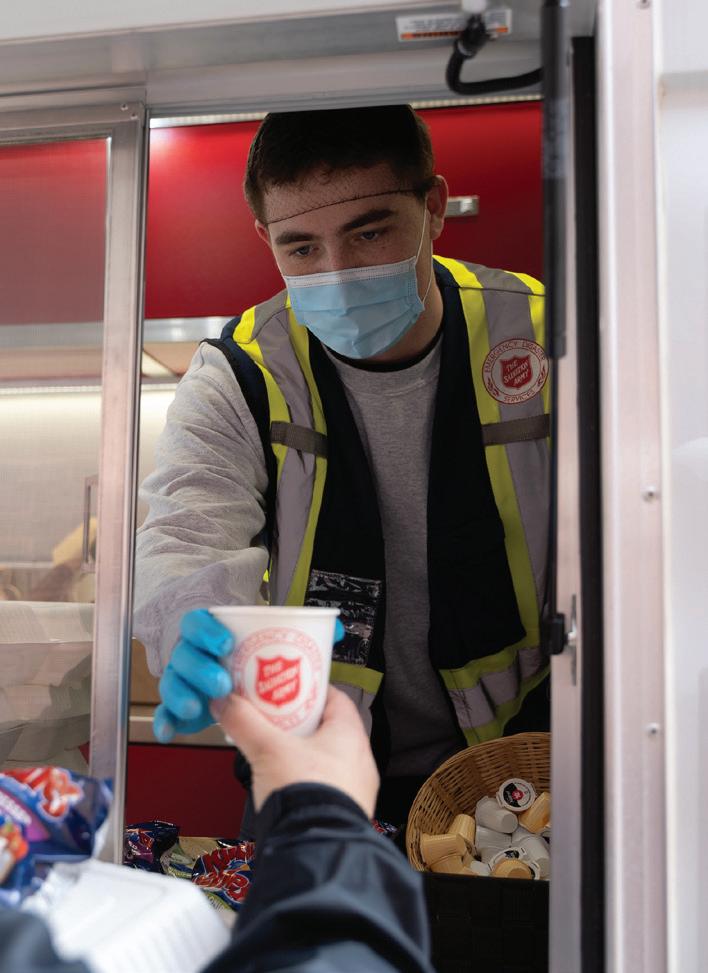
The theme of the conference was storytelling, and the theme Scripture came from Psalm 145:4-7. The conference featured guest speakers from various creative fields, including videographers, rap and spoken word artists, worship leaders,
sound engineers, visual artists and more. “We want young people to see that they can use their gifts to share the gospel, to tell a story—their own story or God’s story. You can tell a story through writing a song, through rapping, through production, lights and sound, through photography and videography,” says Fuentes.
“A lot of people who attend our churches see a brass band and choir, but they might not see other creative areas they can fit into. We want to show them that they belong in the church. No matter what their gifts are, there is a place for them,” continues Fuentes.
Main session guests included Brooke Nicholls, a Juno Award-winning worship singer, songwriter and artist; Raymond To, a rapper and spoken word artist;
stuntman and Guinness World Recordholder Scott Hammell; Pat Chown, who taught audio essentials; Matthew Osmond, media ministry consultant with Canada Bermuda Youth, who taught video production; and Leone McComas, who explored visual art and drawing. Each guest offered their own masterclass, while Captain Jason Dockeray, territorial secretary for children and youth, offered a storytelling session.
“God is the best creative that there is. He created the earth. He created us,” says Fuentes. “Creativity can play a huge part in our faith and ministry. The Youth Creative Conference was a great reminder of that as we worshipped our creator and learned to tell his story and our story through the gifts he’s given us.”
After reading Amy Fisher’s piece (“From Shelter to Home,” October 2022, Salvationist.ca), my reply is Yes! Affordable housing, complemented with the supports vulnerable people need to get re-established, is in critically short supply. As a member of the Simcoe County Alliance to End Homelessness in Ontario, I’m very gratified to see that The Salvation Army is re-evaluating the contribution we can make. May God lead us.
 Joyce Ward
Joyce Ward
I enjoyed this article by Major Shirley King (“The Gift of Years,” January/ February 2023). I liked the reference to “vantage points.” I believe that God has had a hand in the past and I look forward to the future. I also agree with her thoughts that growing older does not always mean faith growing stronger. Many individuals and their families question God’s love when going through the complexity of physical and cognitive changes, and there is a great need to provide continued spiritual ministry for them.
 Norma Rohatyn
Norma Rohatyn
I read this article with interest (“The Cold Community,” March/April 2023). My son and I have regularly gone out on these visits, volunteering with Major Merv Halvorsen. The people are so glad to see us, and we’ve seen such uplift in the community as people look out for each other. As Proverbs 11:25 (NLT ) says, “Those who refresh others will themselves be refreshed.”
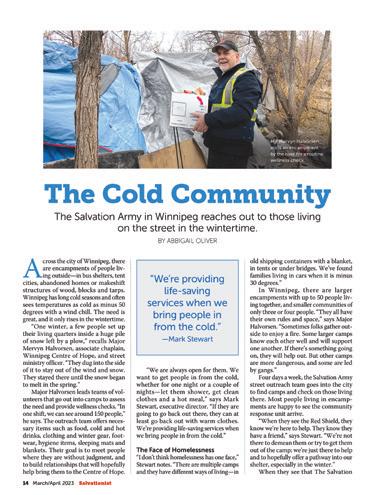 Isaiah Allen
Isaiah Allen
Thank you for this update (“The Salvation Army Addresses Gender Equity for Women Officers,” February 2023, Salvationist.ca). I’m grateful for the work being done to promote gender equity here in our territory among officers and I pray that similar initiatives are encouraged around the world.
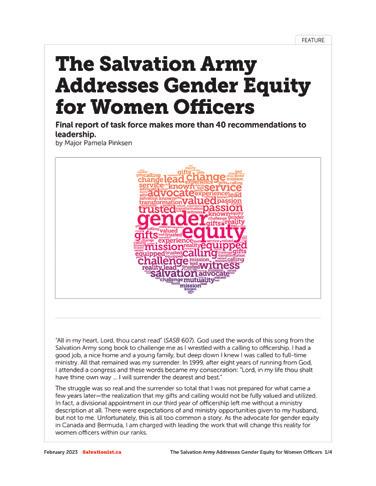 Captain Renée McFadden
Captain Renée McFadden
To be considered for publication, letters to the editor must include your name and address, and a phone number or email address where you can be contacted. Letters may be edited for space and clarity, and may be published in any medium.
It is beautiful to read Captain Crystal Porter’s article (“Right Relationships,” November 2022, Salvationist.ca), which speaks about reconciliation and respect toward our First Nations brothers and sisters. This is especially important for a movement born out of and still having many of the cultural trappings of colonialism. I pray that your gentle guidance will open the eyes of us all as to the damage this has done and is still causing.
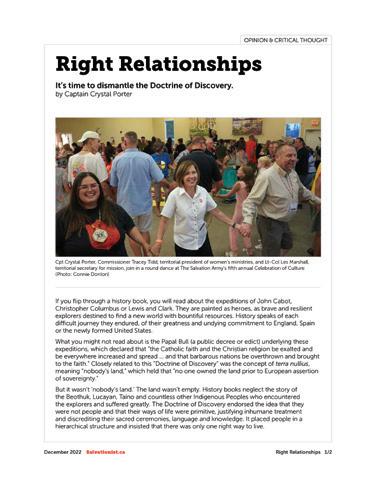 Doug Peat
Doug Peat
Thank you for this insightful and encouraging piece (“God’s Beloved,” January/February 2023). Yes, God loves us, stretchy yoga pants and all—even on the days we do not love ourselves and fall short of our standards and God’s. Thank you for the reminder!
Christine LeBlancThis is a great article (“The Why of Worship,” February 2023, Salvationist.ca). I am part of a Salvation Army corps in the United Kingdom. Many of our “settled” traditions and practices are not wrong, but although they may be comfortable and familiar to us, they may be a stumbling block to the 95 percent or more of our neighbourhood population, who do not enter our church buildings because they don’t see how it relates to their lives, questions and struggles. What would the Apostle Paul say? Is it possible that we are not only losing sight of the Army’s original, radical kingdom vision, but developing the sin of idolatry, where maintaining aspects of tradition and custom mean more to us than refocusing our kingdom vision for the 21st century?
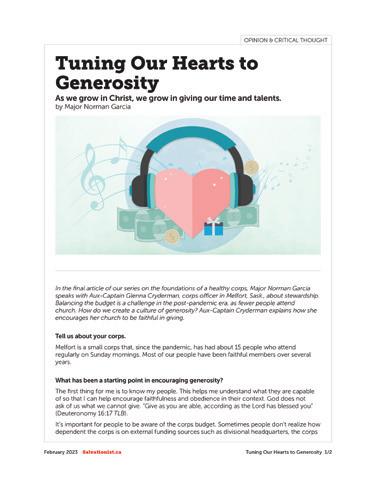
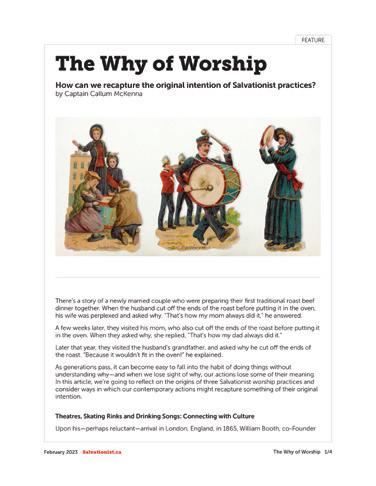 John William Bruce
John William Bruce
A Generous Heart Generosity is an important topic (“Tuning Our Hearts To Generosity,” February 2023, Salvationist.ca). Generally speaking, our culture is a consumer culture, not easily given to generosity, especially in churches. But generosity is a spiritual value. This is one area that could use more articles in your magazine. I appreciate this one.
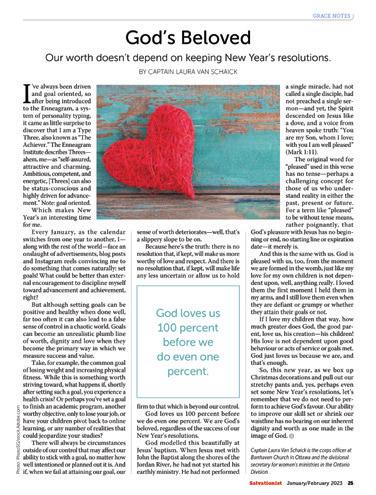 Lorelie Jorheim
Lorelie Jorheim
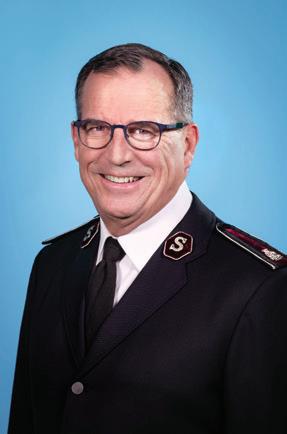
Salvationists from across the Canada and Bermuda Territory and beyond will soon converge on Toronto for the 2023 INSPIRE Conference and Congress, a oncein-a-generation event that will serve as a rallying cry for everyone connected to our organization: officers, employees, soldiers, adherents and friends. It will be an opportunity to gather in God’s presence for a time of rejoicing and worship, as one Army, with one mission and one message.
Congresses are part of the lifeblood of The Salvation Army. The first Salvation Army congress was held in 1886 in London, England. William Booth was determined that the congress should show the world that The Salvation Army was not just a passing wonder of the day.
And so here we are, more than 155 years later, still a vital force for good around the world. We serve in 133 countries, including right here in Canada and Bermuda, where we continue to share the love of Jesus, meet human needs and be a transforming influence in more than 400 communities.
The theme for the conference and congress is INSPIRE, as together we seek a fresh wind of God’s Spirit to breathe new life into our Army. We want this gathering to reignite our passion for mission, to mobilize each congregation to reach out to our communities, care for the vulnerable and share the love of Jesus. We also want to equip our mission partners, in areas such as social mission, business, communications and a myriad of front-line services, to develop their leadership skills and gain new tools for their ministries.
But we can’t do any of this without prayer. In prayer, we open ourselves to God—to his heart, his character and
his purposes in the world. As we draw close to God and dwell in his presence, we experience the love and fellowship of the Trinity. Rooted in that love, we move into the world to reflect and live out God’s mission.
The INSPIRE Conference and Congress has been covered with prayer right from the beginning. Throughout the planning stages, retired Salvation Army officers have been praying for INSPIRE every month, starting in August 2022, using the acronym “Giving Hope”:
August: Grace
September: Invitation
October: Value
November: Involved
December: Necessary
January: Grateful
February: Hospitality
March: Others
April : People
May: Environment
In the lead up to INSPIRE, we will be praying daily following a prayer calendar created by the congress and conference committees. The 40 Days of Prayer begins on Pentecost Sunday and continues until a week after INSPIRE to ensure we follow through with our commitments once we return home.
As part of this initiative, a PDF down-
load will be available that includes a one-page prayer calendar and an expanded prayer guide. The daily guide will also be available through a blog on Salvationist.ca, on the INSPIRE app and via email for those who sign up.
During INSPIRE, an intercessory prayer team will meet behind the scenes to pray through the plenary sessions and congress meetings. A prayer room will also be open from 8 a.m. to 8 p.m., with a volunteer present to pray with any guests who visit the room.
On July 1, Lt-Colonel Brenda Critch, divisional secretary for spiritual life development, Ontario Division, will lead a prayer breakfast. And each of our worship services will have a focus for corporate prayer:
• Officers’ councils: multilingual prayers
• Friday evening: tongsung kido , a Korean style of prayer
• Saturday evening: prayer huddles
• Sunday morning: prayer pods
Each worship service will also provide space for prayer at the mercy seat.
In the days to come, let’s open ourselves to God in prayer, to all that God wants to do in and through The Salvation Army. Let’s seek a fresh wind of God to enliven and inspire us, and to send us out as his people, for the sake of the world.

In just a few short weeks, Massey Hall and the Westin Harbour Castle Hotel in downtown Toronto will fill with the spirit and energy of The Salvation Army. Salvationists, officers, employees and friends will come together at the INSPIRE Conference and Congress to celebrate the mission at work in Canada and Bermuda, and to inspire mission partners to fulfil the work to which God calls them.
The conference will commence on Monday, June 26, and will lead into the congress weekend, ending on Sunday, July 2. There is something on the schedule for everyone—from familyfriendly carnival activities and an exciting CoMissionING program for kids, to celebrating the Reflectors of Holiness at commissioning on Saturday morning, to performances of Skeleton Army (see page 14).
“We want to build and look to the future,” says Lt-Colonel John Murray, territorial secretary for communications and
congress planning chair. “We invite people to come with an open mind, and to engage in ministry in all the different facets and shapes that we celebrate in The Salvation Army.”
Packed with events, worship and time for connection, INSPIRE invites participation from people in every corner of The Salvation Army.
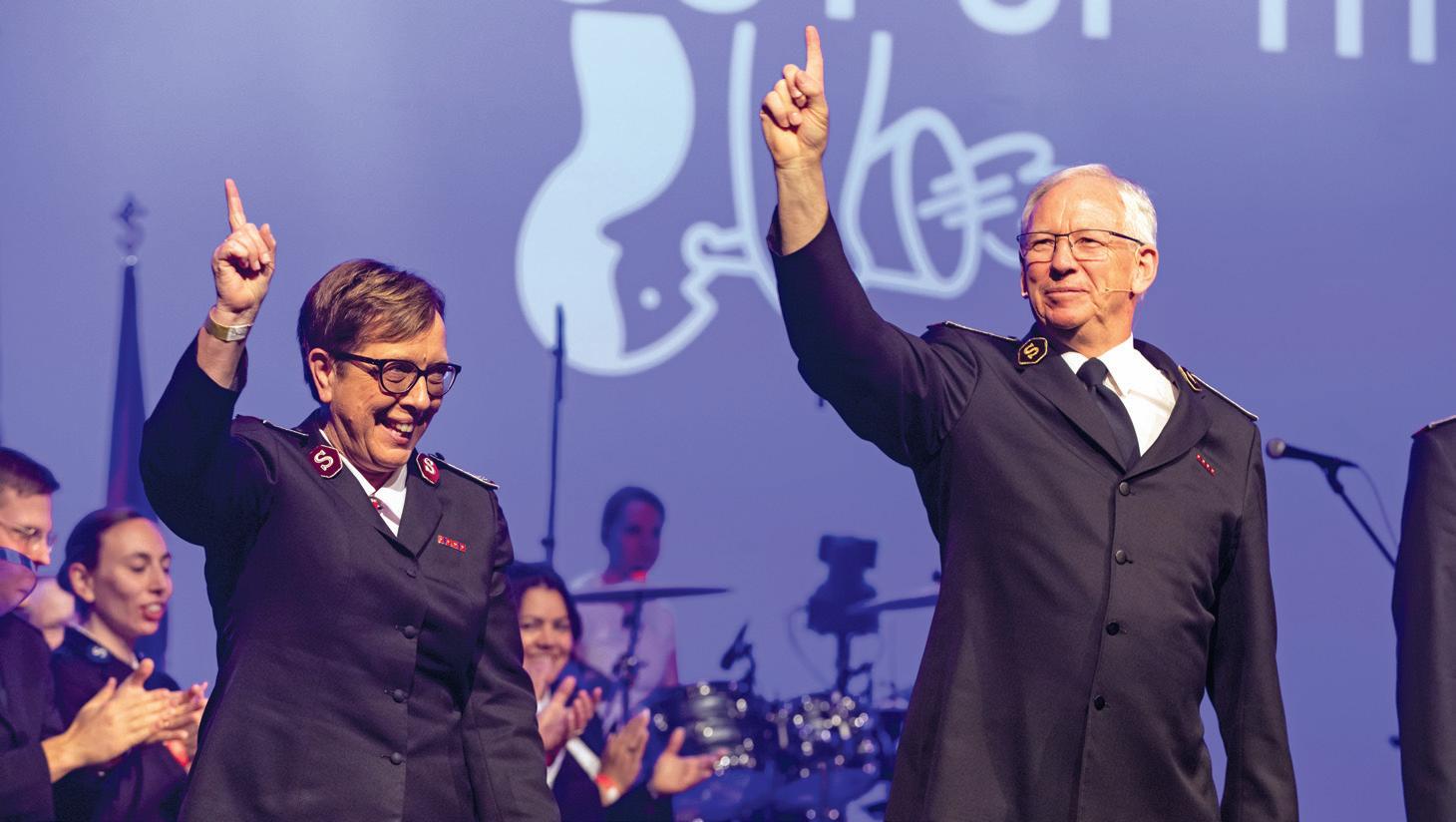
Beginning with the four-day conference, INSPIRE offers learning opportunities for diverse areas of ministry through plenary sessions and workshops meant to teach and enhance ministry tools in all departments, whether in finance, communications, women’s ministries or elsewhere.
With delegates arriving from across the territory and beyond, INSPIRE will be a time for fellowship and meaningful connection. Intentional gathering time has been integrated
On-site at the Westin Harbour Castle Hotel, delegates can visit a Trade North store to purchase items such as Salvation Army apparel, books, music and other resources. There will also be a vendor tradeshow, a fashion show and book signings by guest speakers Reggie McNeal and Jeff Lockyer. Books will be available for purchase at the signings.
On Thursday evening, General Brian Peddle and Commissioner Rosalie Peddle, World President of Women’s Ministries, will attend a gala dinner and awards ceremony at the Westin Harbour Castle Hotel. The awards will honour and celebrate Salvation Army teams and individuals for their accomplishments in response to the COVID-19 pandemic. There are approximately 60 nominees from across the territory.
For baseball fans, the Toronto Blue Jays are playing a home game against the San Francisco Giants on Tuesday, June 27, at the Rogers Centre, only a short walk from the Westin Harbour Castle Hotel. The Salvation Army’s NewFound Brass will open the game with the Canadian national anthem.
into each daily schedule to give attendees a chance to meet and catch up after years of separation caused by the pandemic, and to be inspired by one another.
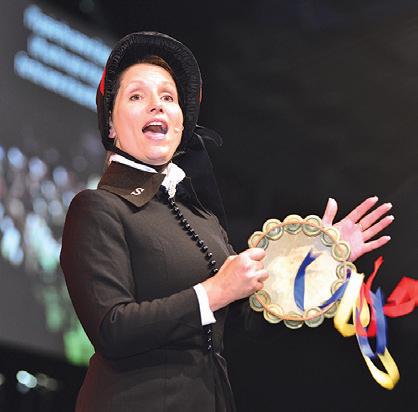
For those wishing to share INSPIRE 2023 with their children, the conference and congress schedule features family-friendly activities throughout the city and intentional youth programming. Youth ages 12 to 18 can participate in supervised day trips to fun Toronto attractions, and on Friday night, an “Army Con” event will take place at the Westin Harbour Castle Hotel with activities such as SA Gaming, music and photo booths. Improv Care, a group of early childhood educators, youth workers and teachers, will offer childcare for infants and young children.

As part of the youth program, children in Grades 1 to 6 can participate in CoMissionING, an interactive spy-themed program running throughout the congress weekend. They will become secret service agents in a top-secret mission, delivered through individual headsets right to their seats.
From June 30 to July 2, four “missions” will take place at Massey Hall. Each mission is connected to the main Scripture and message of the congress sessions, teaching kids how they can apply these lessons in their own faith, and how they can be a young “reflector of holiness” in their own world.
“This program is meant to help kids experience the congress and commissioning meetings in a way that they understand. They can participate in the meetings in a fun and exciting way they can relate to,” explains Sheryl Slous, creative director for ministry strategy and resource in the children and youth ministries department.
“With CoMissionING, we have the unique ability to design mission activities that help teach and unpack the main message and Scripture on a child’s level, and to talk to the kids directly through their headsets, allowing them to engage with the congress services more easily,” she adds.
“The doors of INSPIRE are open to everyone,” says Lt-Colonel Murray. “It’s for people to connect with The Salvation Army, not only as a place where they might work or volunteer, but as a place of worship. The Salvation Army is first and foremost a church with an acute social conscience, and that is what sets us apart. It’s what drives us.”
At INSPIRE , people can come together and be reminded of what makes The Salvation Army signifi cant—its faith, culture, history and people. And when they leave, they can go forth feeling more connected, more engaged and more inspired to build the kingdom
Learn more and register for congress at Salvationist.ca/Inspire. Registration for the conference is now closed.
CONFERENCE & CONGRESS 2023
Four Crest Dancers
Canadian Staff Band and Canadian Staff Songsters
Led by Bandmaster John Lam and Songster Leader Major Len Ballantine.
NEON
NEON was formed in 2016 by the music and gospel arts department at territorial headquarters to encourage and support contemporary worship in the Canada and Bermuda Territory.
NewFound Brass and Chorus
British Columbia’s Gitwinksihlkw Four Crest Dancers, established in 1992, have played an integral role in the revival of Nisga’a cultural singing and dancing and have represented their community on a global stage.
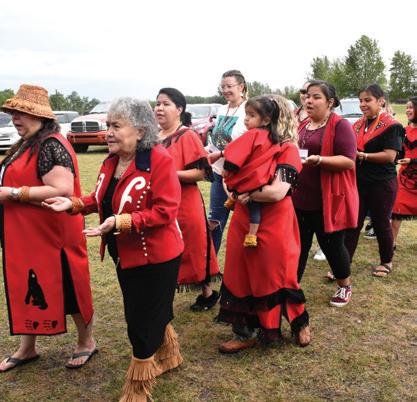

William Barter, Robbie Lee, Jalianne Li, Laura Rowsell Elizabeth Shepherd and Wendy Woodland.
Since re-launching as a divisional music group in 2016, NewFound Brass and Chorus has enjoyed a busy ministry in the Newfoundland and Labrador Division.
North Street Worship Team
The North Street Worship Team from Hamilton, Bermuda, pray that Jesus will receive all the honour and glory as they offer him their sacrifice of praise.
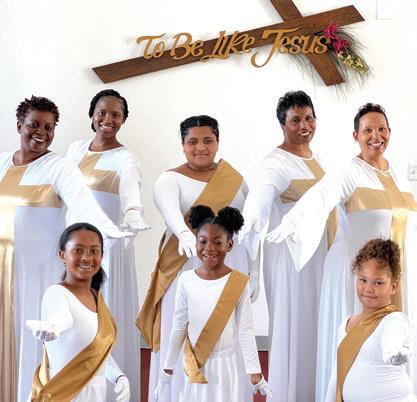
Yorkminster Citadel Singing Company
The Yorkminster Citadel Singing Company, led by
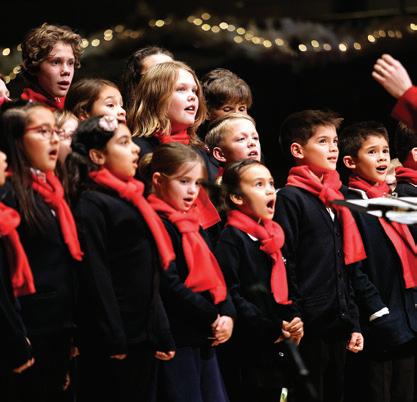
In September 1955, a young married couple and their children, ages three, two and one, walked into The Salvation Army’s Jubilee Congress at the Capitol Theatre in Regina. They had no connection to the Army, were not Christians and did not go to church. But they walked out as saved people.
Now, 68 years later, Salvation Army service and a passion for helping others still run in the family. Extracts from their journals over a lifetime of ministry, shared with Salvationist by their daughter, Major Karen Hoeft, executive director at Regina Waterston Ministries and divisional public affairs officer, Prairie Division, reveal the enduring faith that inspired three generations of service.
they went north on Scarth Street where they saw Salvationists in uniforms entering the Capitol Theatre in large numbers. They went to see what was going on.
“We were just on time, seven o’clock. ‘Praise the Lords,’ ‘Amens,’ ‘Hallelujahs,’ clapping hands; everybody was happy,” writes Gertie in a handwritten testimony from the mid-1960s.
During the service, two of the children grew restless and Gertie took them out into the lobby. When she returned, she sat at the back separate from Bill and their son, Gord.
Bill and Gord spent the remainder of the service by themselves, sitting near an elderly woman from the Maritimes. “I remember very little of her. She begged and pleaded with me to go forward, but
Following the congress, their family and friends didn’t understand why Bill and Gertie had made this decision. “We didn’t have the same interests anymore, and our lives seemed dull to them. But to us it was a full and happier life,” writes Gertie.
The McFarlanes became Salvation Army soldiers, and in 1958, when the corps in Indian Head, Sask., needed someone to fill in, Bill and Gertie became envoys.
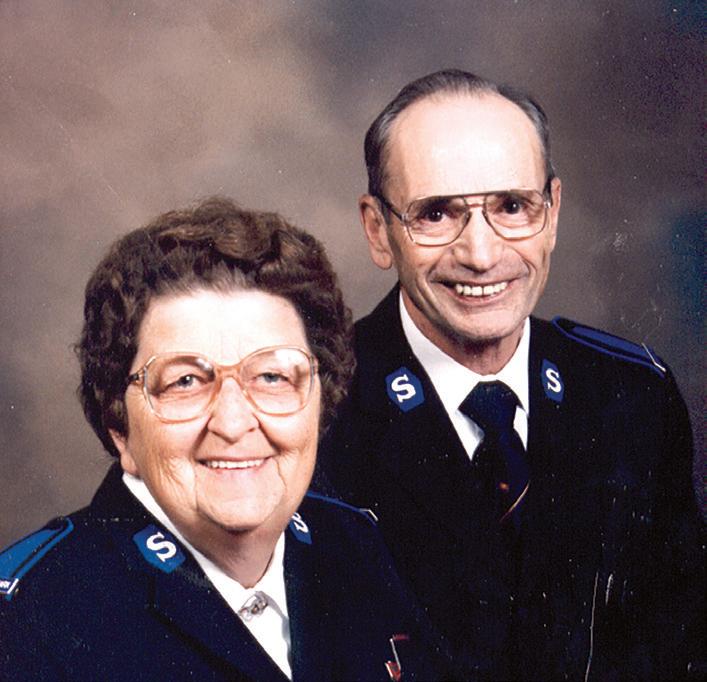
“Dad always took leadership roles in the different corps we went to. Mom was a Sunday school teacher,” says Major John McFarlane, the oldest of Bill and Gertie’s seven children and a retired officer. “Growing up, we were quite active in the Army. I started in the band when I was eight. We were junior soldiers and in the
In the 1950s, Bill and Gertie McFarlane, ages 27 and 25 respectively, lived on a farm in Saskatchewan with their three children, John, Gord and Deb. They weren’t churchgoers. Gertie grew up in a Lutheran family and Bill had never gone to church, though he read the Bible and sought to understand what Scripture said.
One September Sunday, after visiting Regina for supper at the old Bus Depot, the family of five left to go back to the farm but were rerouted due to a road closure on Victoria Avenue. Instead,
I had said no and that was final for the night. I would think about it and come back at a more convenient time,” writes Bill in his testimony, dated August 1982. “But when the band played O Boundless Salvation, my feet got up and carried me down the aisle.
“A series of miracles, God led us to a special place at a special time. I left the meeting with joy and peace because I found what I had been looking for,” writes Bill, who accepted Christ that night at the mercy seat.
Bill did not know it at the time, but his wife had gone forward at that meeting as well. “The wonderful thing about it was neither of us knew that the other had accepted Christ until the meeting was over,” writes Gertie. “We had never been to an Army meeting before and we knew the Lord had drawn us to this congress for a special purpose—to save us.”
youth group. Our Sundays were busy.”
Major John was commissioned in 1980 as part of the Proclaimers of Salvation Session. After finishing his master’s degree in health administration, he worked as an assistant at Ottawa Grace Hospital where he eventually became executive director.
“I kept telling my session-mates I had a bigger congregation than they did with all our patients, their families and the hospital staff,” says Major John. “I had an opportunity to minister to people in a different way besides preaching. When they come into the hospital, most people are at a point where they are in need. I was walking alongside people, meeting them at that point.”
Like Major John, Major Karen Hoeft, the second youngest of the seven children,
ABBIGAIL OLIVER
“ We knew the Lord had drawn us to this congress for a special purpose—to save us.”
—Gertie McFarlaneGertie and Bill McFarlane became senior soldiers at their home corps, Regina Citadel, in 1955, only a few months after they both accepted Christ at congress
also pursued ministry with The Salvation Army. She developed a passion for social service work at an early age. Her father, Bill, volunteered at the Waterston Centre men’s shelter in Regina for many years, and each Sunday, her parents would invite men from the centre home for a roast beef lunch.
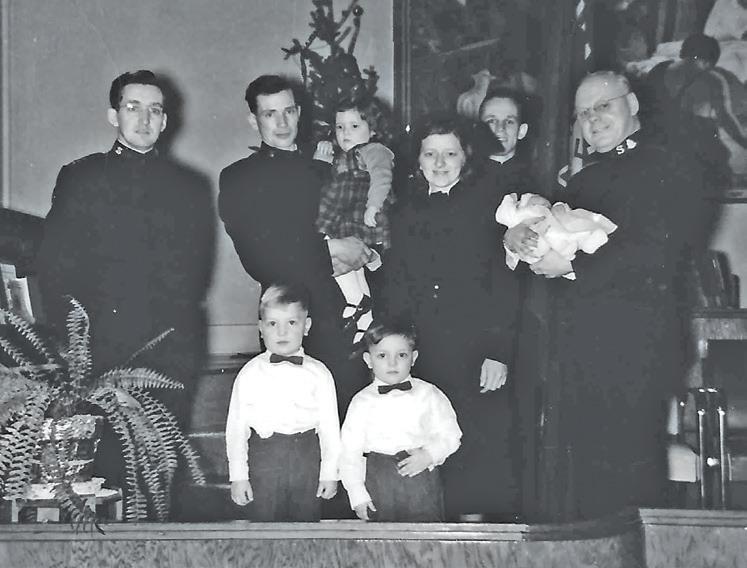
“We were a very poor family, and this was our only main meat meal a week, but my parents brought these men into our home to share it with us. Some of them remained family friends. In fact, my father-in-law was one of those men who came through a Salvation Army addiction program,” says Major Karen. “That was my parents’ journey. They walked with people that many others didn’t pay attention to.”
At eight years old, Major Karen experienced God’s call during an open-air service when she felt somebody tap her on the shoulder. “Don’t quit doing this,” she heard them say, but when she looked back, nobody was there.
Today, Major Karen serves in Regina with her husband, Major Al Hoeft, who is now the divisional secretary for public relations and development and divisional director of emergency disaster services, Prairie Division, and executive director at the Regina Waterston Ministries. As officers, Majors Hoeft have continued operating shelters and other urban ministries, focusing on sustaining The Salvation Army’s mission through social services.
“I am a Salvationist of Salvationists. I’ve been on the front lines for 35 years operating shelters, corps, a correctional facility and detox program, and now I work in government relations,” says Major Karen. “The Salvation Army has a gifted place in community. My passion is
to walk in that space that has been gifted to us and be that transforming influence.”
In 2022, Lieutenant Nathanael Hoeft, the son of Majors Al and Karen, was commissioned in the Messengers of Reconciliation Session. Growing up in The Salvation Army, he was exposed to a missionfocused life and shaped by the values of hope, service, dignity and stewardship. Involved in corps activities from a young age, such as youth group, the worship team and band, Lieutenant Nathanael developed in corps leadership by leading Bible studies, co-leading children’s ministries and organizing sporting events in his community and congregation.
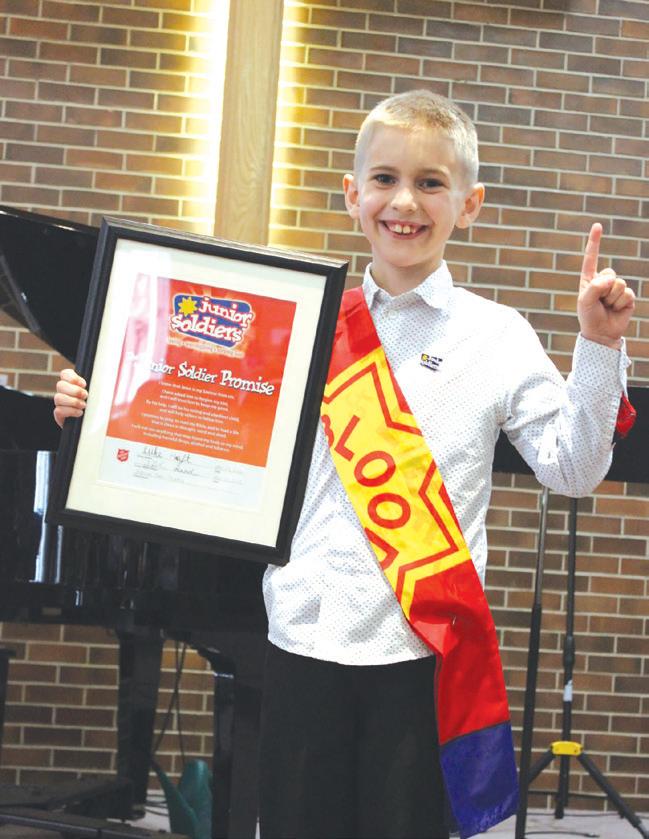
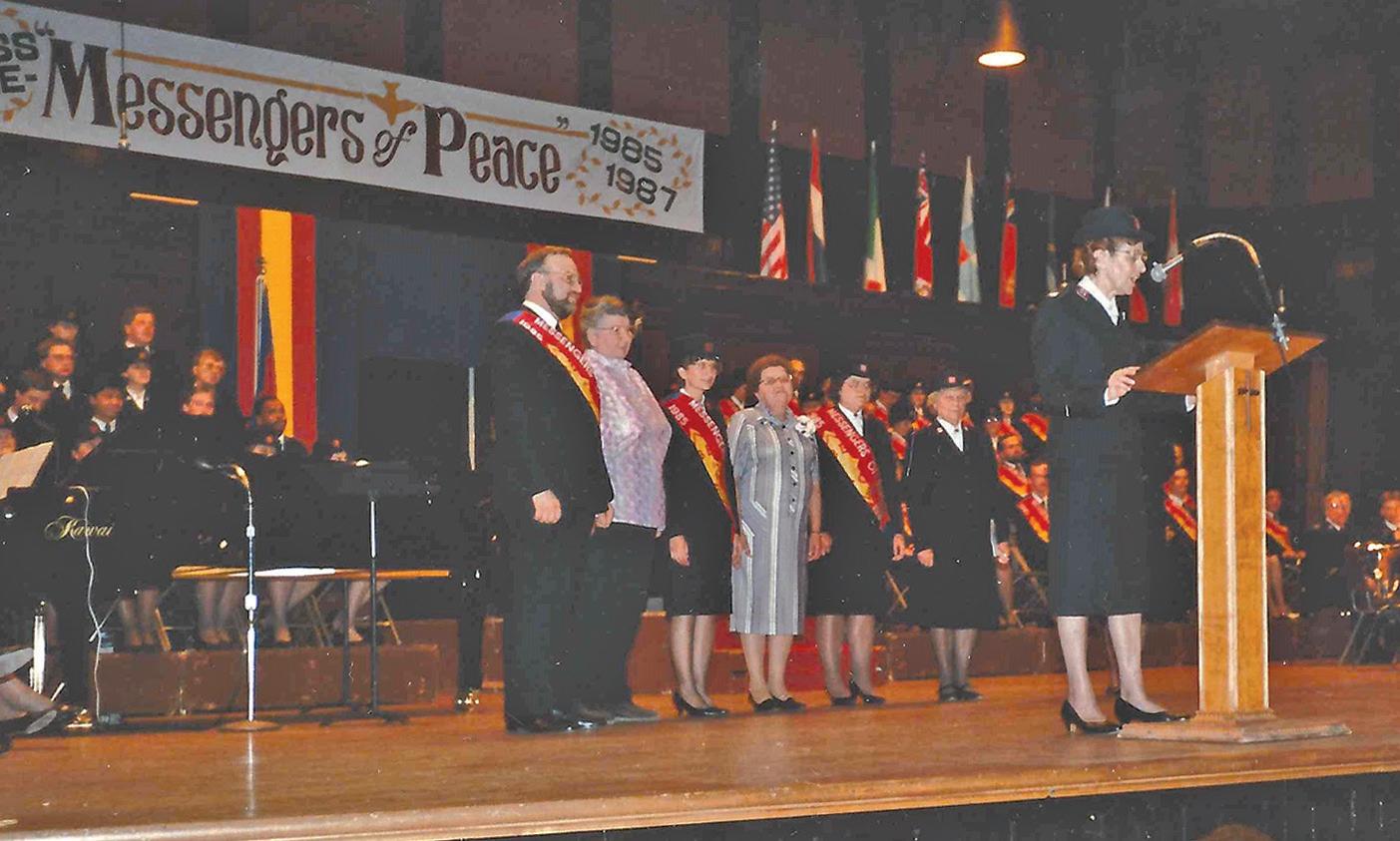
Now, currently appointed as corps officer in Williams Lake, B.C., alongside his wife, Lieutenant Jessica Hoeft, Lieutenant Nathanael leads the church and food bank, and runs breakfast and lunch programs, a large drop-in centre and a thrift store.
“I love building relationships with people, helping them feel valued, at ease and loved in an environment that is not always filled with these qualities,” says Lieutenant Nathanael. “I hope that with these relationships, we can help break down barriers of distrust that many people have with the church, and we can share the loving nature of God.”
Following the influence of his parents’ ministry, and with various other family members interconnected through the Army, Lieutenant Nathanael hopes to continue the transformative work entrusted to him and to pass this along to his children. His 10-year-old son, Luke, was enrolled as a junior soldier in 2022 and is already considering what life
might look like as a Salvation Army officer when he grows up.
“The Salvation Army is like a family tradition,” says Luke. “To me, being a junior soldier is a step closer to being with God.”
“The reason my parents decided to join The Salvation Army was because they saw The Salvation Army making a difference in the community,” says Major Karen. “Our power is not that we’re known as a church. We love God and we love people, and we are built to make a difference.”
As the streets of Toronto once again fill with Salvation Army uniforms for this year’s INSPIRE Conference and Congress, Major Karen reflects on what it means to her own story. She believes that the uniform she wears signifies something greater than just church or family history—it means being a trusted voice in the community, a leader and a friend to people from all walks of life. “A congress is not to celebrate who we are but how we go forward and continue on the journey of helping others. That’s my generational story.”
New musical to make Canadian debut at INSPIRE.

When The Salvation Army began in London, England, early Salvationists faced opposition from various groups—including one called the Skeleton Army. The confrontations between the Skeletons and the Salvationists often resulted in open rioting, even violence. The dramatic true story of this conflict comes to life in a new musical called Skeleton Army, which will make its Canadian debut at The Salvation Army’s INSPIRE Conference and Congress in June.
W ith music and lyrics by Canadian Staff Songster Leader Major Len Ballantine and based on a book by John Copeland, the musical is directed by Brad Cain, produced by Carol Jaudes and originally conceived by Neil Leduke, territorial director of marketing and communications. Ahead of INSPIRE, Salvationist managing editor Kristin Ostensen spoke with Kathryn and Kyle Higgins, who star in the two-actor show, about Skeleton
Army , their favourite scenes and why they’re thrilled to finally bring the show to Canada.
What is Skeleton Army about?
Kyle Higgins: Skeleton Army is set in 1880s London and focuses on Charles Jeffries, who was a leading member of an anti-Salvation Army gang called the Skeleton Army. The story focuses on his opposition to The Salvation Army, his conversion into The Salvation Army and his legacy afterward. He actually goes from being the second-in-command of a branch of the Skeleton Army to being the principal at the Army’s international training college. It’s such an amazing transformation story!
The musical made its official debut in New York City in 2019. How did audiences respond?
Kyle Higgins: It went great. It was really neat being able to open up in the heart
of New York City, at Times Square Corps. They have this really nice black box theatre space, known as Theatre 315. And it suited the way that the play was staged, which is almost in the round, so you’re surrounded by the audience while you’re performing. It was perfect for the energy of the show.
One could say Skeleton Army is a family affair, as you two are a married couple and Kathryn’s father, Major Len Ballantine, wrote the music and lyrics. What has that been like, doing this as a family?
Kathryn Higgins: It’s been amazing because I’ve never had a musical written specifically for me. I don’t think anyone knows me as well as my dad—he knows my range, what my strengths and weaknesses are. So, when we first got the music and started singing through it, I thought, Wow, this fits right in the pocket! It was really exciting.
Kyle Higgins: There’s never been someone who I’ve been more comfortable with acting on stage than Kathryn. I think we’re very good at reading each other, and there’s a natural chemistry that was immediately apparent. And we get to practise at home, too, which helps.
Kathryn, you play three very different characters in Skeleton Army: a barmaid at the Blind Beggar pub, a Salvation Army officer who helps set Jeffries on a new path, and Jeffries’ wife. Which one do you enjoy playing the most and why?
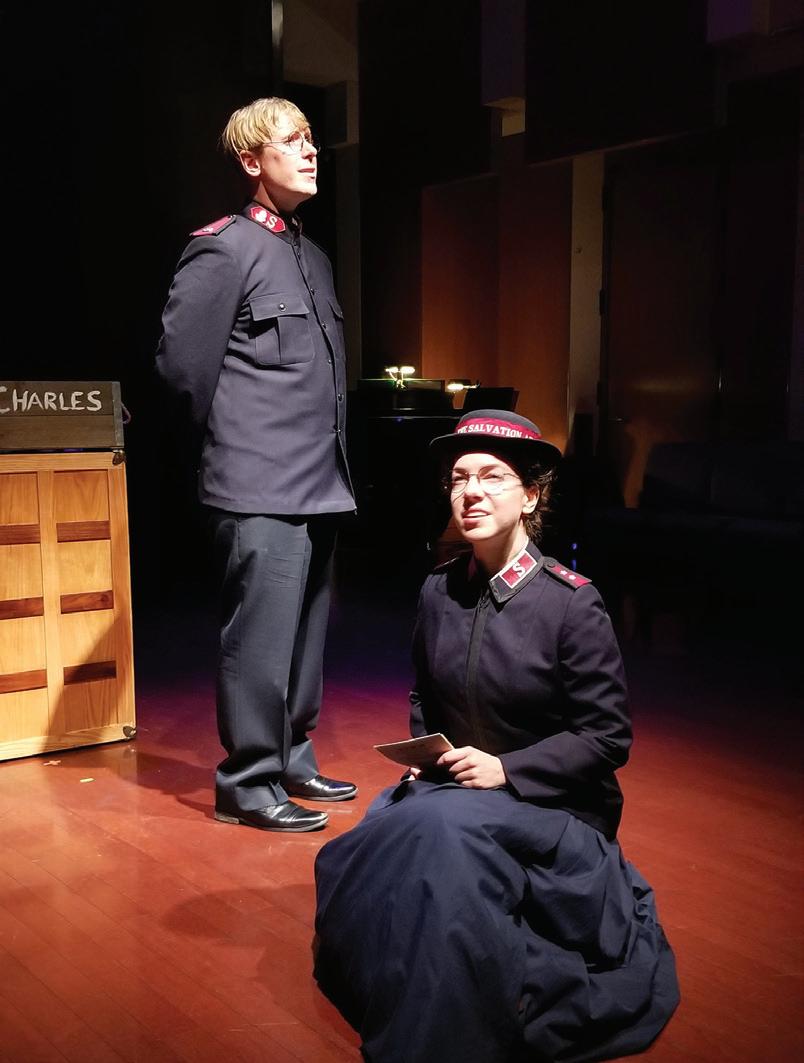

Kathryn Higgins: My favourite is Scarlett, the barmaid, because she’s fun and sassy and maybe the most like me. Her accent is a real East Londoner accent, where I grew up, so it feels like home to speak in her voice. And her journey as a character is so interesting because she is rough around the edges, and very protective of her heart—she doesn’t let people in. She cracks jokes, she’s kind of rough and tumble with the guys at the bar and has a “nothing can bother me” attitude. And as the show progresses, the audience watches her go from that to someone who has something to say, who has heart, who has a soul and who is learning that there is light in the world, because her world is so dark. That arc is so fun to play.
What is your favourite scene or moment in Skeleton Army?
Kyle Higgins: Mine is one that we call the lamppost scene near the middle of the play. Charlie and Scarlett have a conflict where Scarlett finally reveals how she’s feeling and Charlie’s blown away by it. The words, how they were written by John Copeland, really flow nicely. It’s a great scene. I also like the bar scene at the start, too, because I get to hand out “beer” chalices to the audience members and get them to drink—it’s actually ginger ale. It’s always big energy and good fun.
Kathryn Higgins: My favourite is also the lamppost scene. That scene is so exciting because it’s the first time that we get more “physical” toward each other. It’s stage combat, but it’s not a fight. It’s a verbal fight that could get physical, but the audience isn’t sure if it’s going to go too far or not. That’s fun to play as an actor.
I also have a favourite moment where Scarlett speaks her heart at the watch-night service. It’s this great
long monologue where I go from the Salvation Army captain, to Scarlett, back to captain. And Kyle gets to go take a sip of water [laughs] while I’m going back and forth, talking to different characters who are essentially talking to each other. And that’s a really fun section of the script where it looks like two characters, but it is just me. But even in my own mind, I’m thinking it’s two characters. I’m seeing Scarlett when I’m the captain; I’m seeing the captain when I’m Scarlett.
Skeleton Army is an 80-minute one-act play. How do you keep your energy and focus going when you don’t really get much of a break? Kyle Higgins: I get lost in the character. It’s so much fun to be up there that I don’t really even consider my energy. I’m always more energetic at the end of the show than I am at the start because the emotions accelerate my excitement. But I’ve got it a little bit easier than Kathryn because, as she was saying, there’s a whole chunk right near the middle of the play where Kathryn is playing all three characters, essentially, and I just get to go in the back of the stage and have a nice long drink of water. [laughs]
Kathryn Higgins: It’s true, what Kyle said about feeling really energetic throughout. While I’m on stage, I’m so engrossed in the character, we’re so engaged in connecting with each other and connecting with the audience
“I get lost in the character,” says Kyle Higgins, who plays a
because the show is so interactive— the audience becomes the Skeleton Army, they become the patrons at the bar, they become the congregation at the church service. So, it’s just go, go, go. You’re invested.
How are you feeling about bringing the play to Canada?
Kyle Higgins: A lot of my family hasn’t seen the show yet, so I’m thrilled to be able to bring it to them because it’s this thing that we’ve been talking about for years.
Kathryn Higgins: I agree, it’ll feel like a homecoming, being able to show our friends and family what has been such an integral part of our lives the last few years. I’m really excited to bring it to Canada.
So, what’s your bottom line? Why should everyone see Skeleton Army at INSPIRE this year?
Kyle Higgins: It has great music, it’s historical, so you’re learning about The Salvation Army, and it’s an inspiring story of transformation.
Kathryn Higgins: If you are struggling to believe that God can redeem the garbage in your life, then this show is for you.
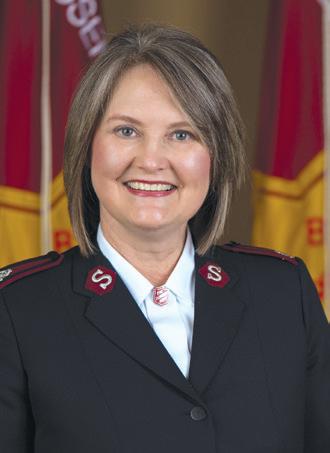
On July 1, the Canada and Bermuda Territory will commission 12 officers in the Reflectors of Holiness Session as part of the INSPIRE Conference and Congress. As these Salvationists prepare for this new chapter of ministry, they reflect on their calling, their training experiences and what it means to live holy lives as ministers in The Salvation Army.
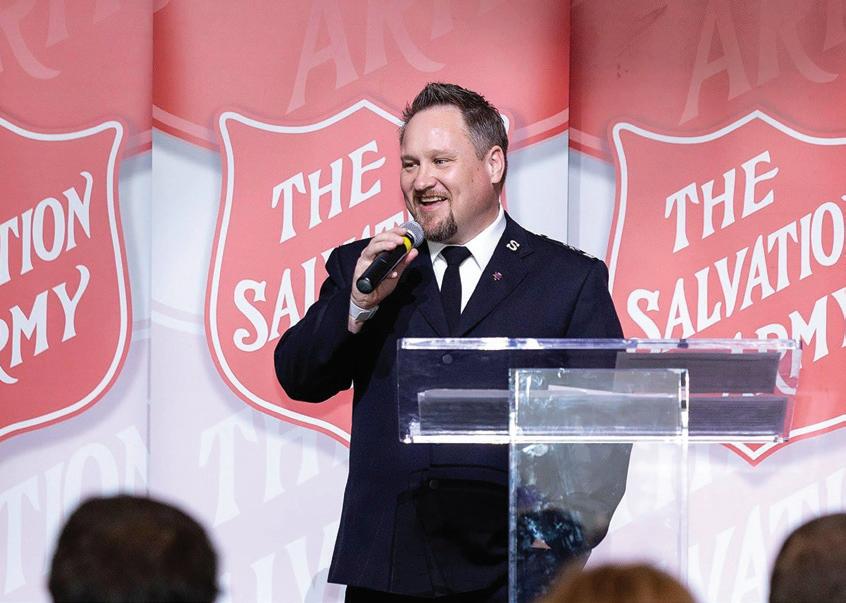

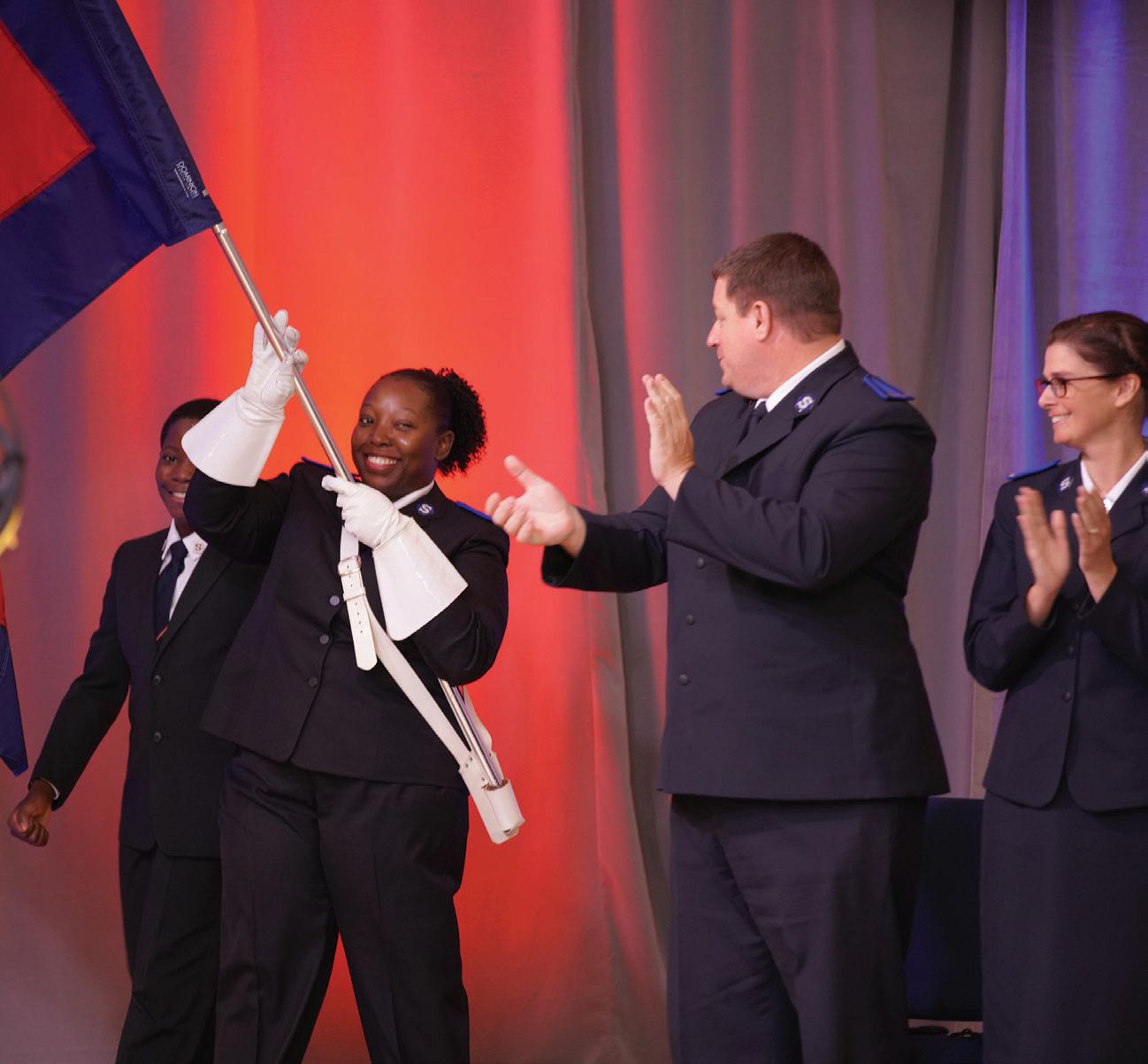
On behalf of the staff of the College for Officer Training (CFOT) and training partners across the territory, I would like to present the Reflectors of Holiness Session, who will be ordained and commissioned as officers of The Salvation Army Canada and Bermuda Territory.
I commend these individuals to you as people who have opened their hearts and minds, letting the Spirit of God shape and fashion them in Christ’s likeness. They have demonstrated a faith put into action, striving to live holy lives wholly committed to loving and serving others as God has called.
The training program, consisting of spiritual life development, theological and biblical studies, and mission and ministry formation, has provided a solid
foundation on which these Reflectors of Holiness have been able to work out their calling as Salvation Army officers. The CFOT staff and field training officers are honoured to have journeyed with this kind, caring, helpful, hardworking, generous, curious and dedicated session.
As they contemplate the covenant they are entering, we are confident they will continue to reflect the holiness of Christ no matter where they serve in the Canada and Bermuda Territory, responding daily to the holy calling of God to “be holy, because I am holy” (see 1 Peter 1:15-16), and in so doing, fulfil the mission and vision of The Salvation Army to share hope wherever there is hardship and build just communities that know the love of Jesus.
As CFOT releases these new officers to the territory, we affirm their calling to serve as officers in The Salvation Army, reflecting God’s holiness in sharing their lives with whosoever. Please join us in praying for them and their families as they travel and settle into new ministries and communities across our territory. God bless them, their ministry and the people they serve.
Major Deana Zelinsky Training Principal Photo: Symon PtashnickEntering training, I assumed that the courses I would gravitate toward would be on theology or biblical studies, as those have always been of interest to me. Instead, I found myself drawn to homiletics (preaching), and it was in that class that I truly began to understand that God is equipping me for what he has called me to do. My sessional name is a daily call to holiness and a reminder that God is the source of all holiness. We are to be a light to the world, but only to glorify our Father in heaven. Reflecting God’s holiness requires me to let go of my own desires so that God is visible in all I do.
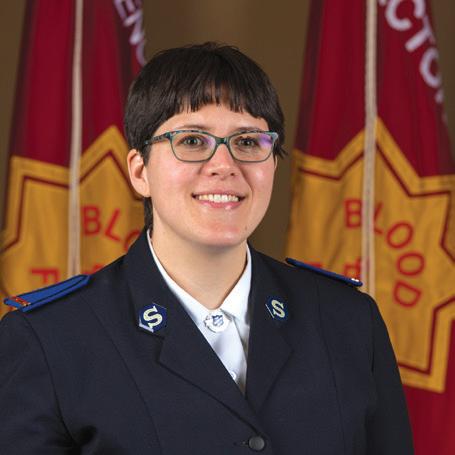
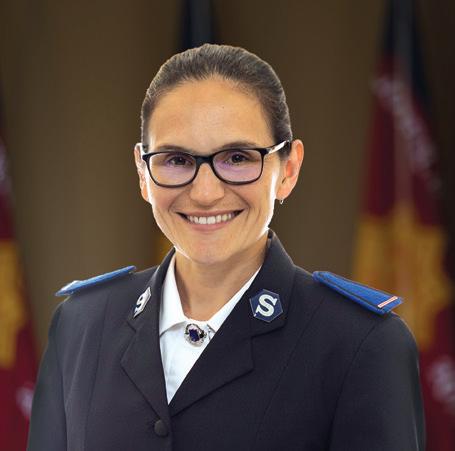

My calling to officership has been a lifelong journey. The culmination of it all happened during the pandemic when I was desperately looking for direction for my life. I finally said “yes” to God’s call, things started to fall into place, and the direction for my life felt right again. As I begin the next stage in full-time ministry as a Salvation Army officer, my prayer is that I will always remember that my ministry flows out of my own relationship with Jesus. As I continue to deepen my relationship with him, he will empower me to continue doing his good work.
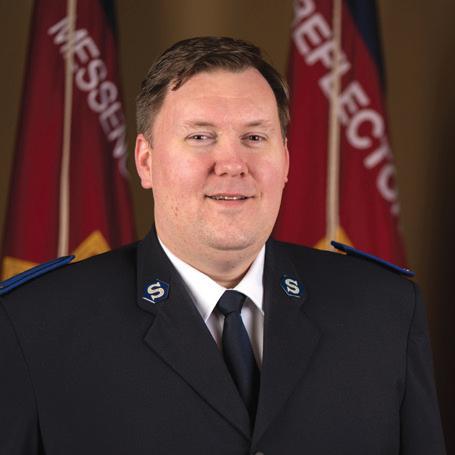
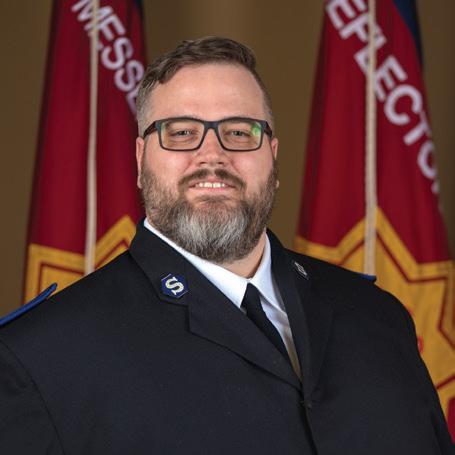
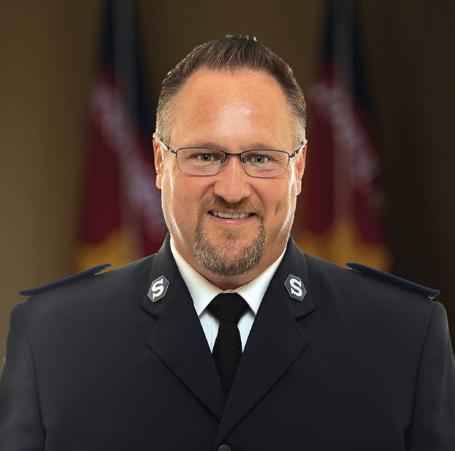
Our sessional name is meaningful to me because it encompasses so much of what Jesus cares about. We grow in holiness in our relationship with the Lord, and that is reflected for others to see as we meet their needs both physically and spiritually. It is also very meaningful to be part of a session because it is an affirmation of my place in God’s plan, not just individually, but corporately, which is only appropriate in a movement of God like The Salvation Army. I want to serve God boldly, being a reflection of Jesus in this world so those I encounter may be saved and served in Jesus’ name.
My training experience has been wonderful. Gathering in community has been strengthening, for iron sharpens iron. Studying the Bible has taught me so much about who God is, his love for us and his mission. I am filled with boundless joy, for I have grown immensely in my love for Jesus and deeply desire to be like him. To me, holiness means surrendering myself to love God with my whole being and to share this zeal with the world. I am to be set apart so that I can be all that God calls me to be.
My call to officership has been a series of quiet revelations, beginning with a neighbour’s invitation to the discipleship program Awana as a child. In my mid-20s, God nudged me to attend an Alpha course and I asked Jesus into my heart for the first time. I always wanted to help people but never really had a specific calling. Once my husband shared with me that he felt called, people began affirming that I should be an officer. This seemed preposterous to me! But it kept happening, so I prayed, “If this is what you want, God, please open the doors.” I felt I was just a “worker bee.” But the second time I attended an officership information weekend, God emphatically whispered to me, “Be a worker bee for me, Miya!”
Training in the field has allowed me the opportunity to put into practice, every day, what I am learning. Being connected to people and having the opportunity to invest in lives has been a privilege. This pathway has stretched me and caused me to really be connected to the Holy Spirit, to find strength and peace, especially in difficult seasons. I am a Reflector of Holiness! My world needs to see Jesus more and more, and as a Christ-follower, I have a responsibility to reflect the light of Christ through my words and deeds so that God can use me to help build his kingdom.
Cadet Natalia DeBoer
I was called to full-time ministry at a young age but wasn’t willing and ready to accept the call. Like Moses, I had to spend time in the desert to learn to hear God’s voice and be prepared for his mission. Through a Bible study, God taught me about the difference between human reasoning and God’s perspective. It opened my eyes to being faithful in the little assignments God gave me. He used these smaller assignments to adjust my life and character in little ways, preparing me in ways I could not see or understand. By learning to obey him, I can now see his hand guiding me to be ready to fulfil his purpose in his time.
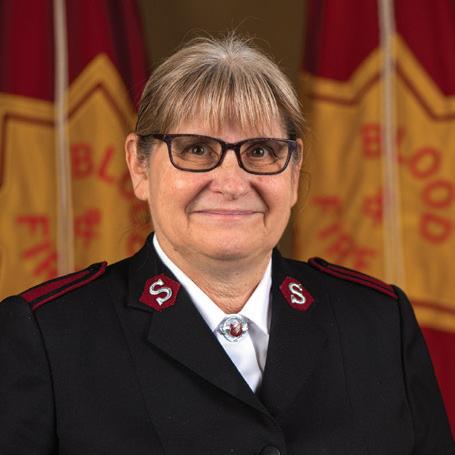
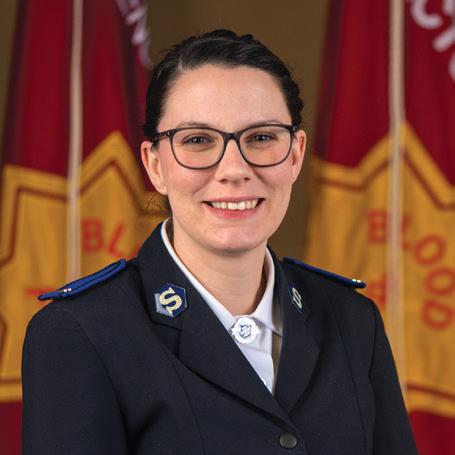
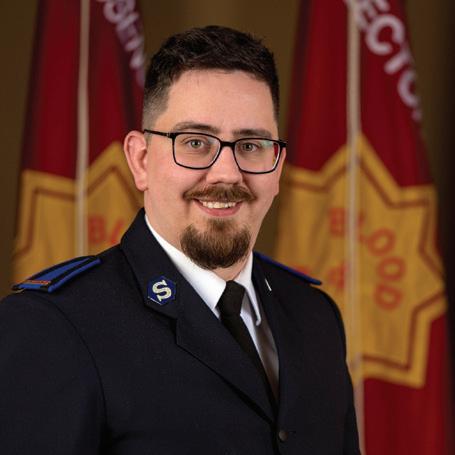
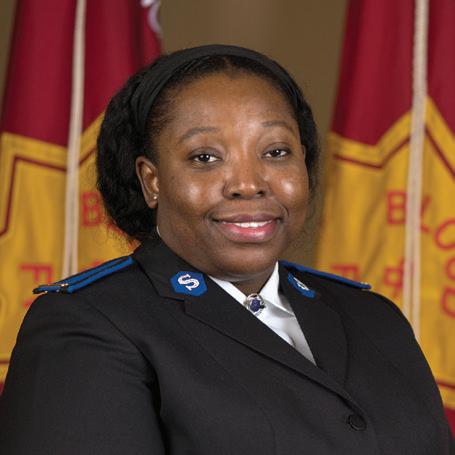
My training to become a Salvation Army officer has been a joy—spending time at several corps in Winnipeg and experiencing different expressions of worship; learning practical tools of how to connect with God; learning alongside staff officers who were invested in seeing growth in me and my session-mates; and creating relationships with cadets, officers and Salvationists in the city. I am excited to engage in ministry with those I meet in my new appointment, and to learn more about who I am and how I can shepherd God’s people as he leads and guides me.
For me, to be a “reflector of holiness” is the goal of the Christian life—to become more like him and less like me. It’s a call to shine my God-given light in all circumstances, with all people. I pray that God continues to refine me and deepen my relationship with him, to give me wisdom and discernment so that all I do and say flows out from my relationship with Jesus. As I begin this next stage in my ministry in The Salvation Army, I hope that I continue to hear God’s voice and act in humble obedience every day, with the same zeal and spiritual fervour, no matter where he may lead me.
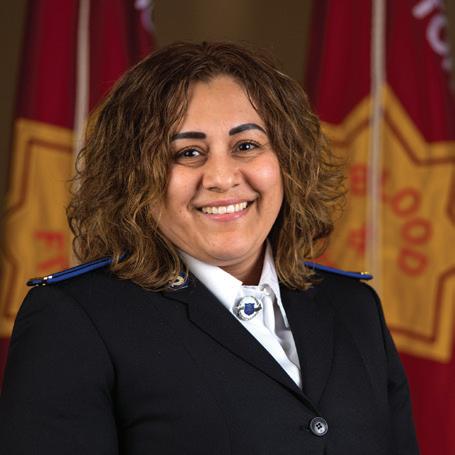
My call to officership was unexpected, even unwanted, but undoubtedly the best thing that has happened to me. I started working at my ministry unit after being stirred by God to change my life’s direction and follow the Holy Spirit’s lead. I felt confirmation within a couple of months that this was where I was supposed to be and that being an officer was what I was called to do for the rest of my life. My sessional name means that God’s glory is within me. I am set ablaze from within, refined and consumed, so Christ is the only visible thing.
My sessional name reflects what God has been doing in my life for the past four years. Reflectors of Holiness fits me well because of the powerful and transformative work God has done in me through his Holy Spirit. I have been set apart for God and his kingdom by his grace, love and mercy over me. God has been working and still is working in my life. Commissioning is not the end of my journey but a part of it. My prayer is to do God’s will and always be sensitive to his presence through the Holy Spirit. I want to follow him for the rest of my days and share his perfect love with others.
I first felt the calling to Salvation Army officership when I was 12 years old, attending youth councils in Nova Scotia. I remember listening to the song Consuming Fire and feeling the Holy Spirit moving and speaking to me in such a clear way. Over the past 7½ years, I have been on a journey as I moved out to Winnipeg, where I attended Booth University College. In that time, God has reaffirmed my calling to officership, and everything that I’ve done and experienced has prepared me for where I am today. As I enter this next stage of ministry, I hope that God will lead and direct me in the way he wants me to go.
This summer, our territory’s College for Officer Training (CFOT) will welcome the first session of cadets into its new eight-year training program. This training program covers the formative and ministerial development over one year as a candidate, two years as a cadet and five years as a commissioned lieutenant.
The decision to move to a new model of training is one that was made with considerable thought and reflection. In March 2020, a CFOT report called “Officer Training: A Strategy for the Future” was published, outlining many of the challenges of the traditional residential model. At the same time, there had been an increasing awareness that the role of the Salvation Army officer has taken on many complex and specialized characteristics, some of which were unimaginable a decade or two ago. In addition, changing candidate and cadet demographics—an increased number of second- or late-career cadets—mean new recruits aren’t always suited to the traditional residential training program. Feedback from the field has highlighted that recently commissioned officers have felt unprepared for the realities of ministry after leaving CFOT. Though they learned many important and valuable things in the classroom, the experience of being an officer was very different.
In 2021, a working group made up of officers from various ministry backgrounds across the territory was assembled to consider these changing demographics and develop a new, flexible training program that uses field-based, experiential learning to ensure that lieutenants are well prepared for ministry upon commissioning. In placing a greater emphasis on experiential learning, CFOT will give cadets opportunities to apply what they
learn to real-life ministry situations under the supervision of an experienced corps officer or ministry unit leader, as well as an authentic experience of the life of a Salvation Army officer in training to ensure their readiness for ministry.
Rather than adding more to the already robust two-year training program, elements have been reprioritized with a mind to mission readiness. Cadets will live close to and work in corps for several days a week, under the mentorship of an experienced corps officer or ministry unit leader, and be on campus at CFOT, which is now located on the fourth floor of territorial headquarters (THQ), the other days. Sabbath rest is also factored into the cadet schedule, ensuring a healthy rhythm of life is established early on in their formation.
Cadets will also be introduced to a wide variety of Salvation Army ministries and worship expressions across the territory. While the number of courses cadets take during the two years of training has been reduced, courses will be spread over five years after commissioning, as CFOT now assumes the responsibility of overseeing and supporting the development of lieutenants. The delivery of this curriculum will be done in collaboration with divisions, Booth University College, THQ departments and other external organizations.
By commencing in the summer, the CFOT training program shifts from a 22-month program to a 24-month program. Whether cadets are relocating to the Greater Toronto Area (GTA), as oncampus or field-focused cadets, or not, as cadets in appointment and auxiliarycaptains, training will begin in July. This aligns better with the territorial annual officer move calendar and will permit CFOT time to identify appropriate field-
training officers and corps in the GTA, and find appropriate housing for on-campus and field-focused cadets. Families will be able to move in, meet their new corps family and orient themselves to their new neighbourhood.
The July start will also allow time to identify appropriate appointments in the territory for those with advanced standing who are accepted as a cadet in appointment or auxiliary-captains, in which training takes place while leading a ministry unit.
Regardless of advanced academic standing and years of experience in ministry, all pathways of training require engagement with the spiritual formation program. Spiritual maturity and character development are of the utmost importance in the training and development of Salvation Army officers. Orders and regulations for the training and development of Salvation Army officers consistently place spiritual formation as the priority of training. We often cite the phrase “knowing, being, doing” to describe the training program objectives, but it is more accurate to say “being is first among knowing and doing.” Being shapes knowing and doing.
These changes to the training model, along with an emphasis on applied, fieldbased education, will give newly commissioned Salvation Army officers a solid foundation for the various aspects of Salvation Army ministries and prepare them for the realities of mission and ministry in the 21st century.

Look for more details about the changes happening at CFOT in our July/August issue.
Dr. Michael W. Boyce is the director of program implementation at the College for Officer Training.
The conversation is still fresh in my mind, almost as if it took place yesterday. I sat in then Commissioner Clarence Wiseman’s office in Toronto and we talked about Salvation Army officership. I wanted to explore possible ways to engage in Salvationist ministry, but without becoming an officer. I didn’t want to be bound by the requirements of officership. And I couldn’t see myself living the life of a cadet. There was good give-and-take in the conversation. Finally, this gracious leader looked me in the eye and said, “Ray, I think your best contribution to The Salvation Army will be as an officer.” Fifty years later, I still find myself thinking about that conversation.
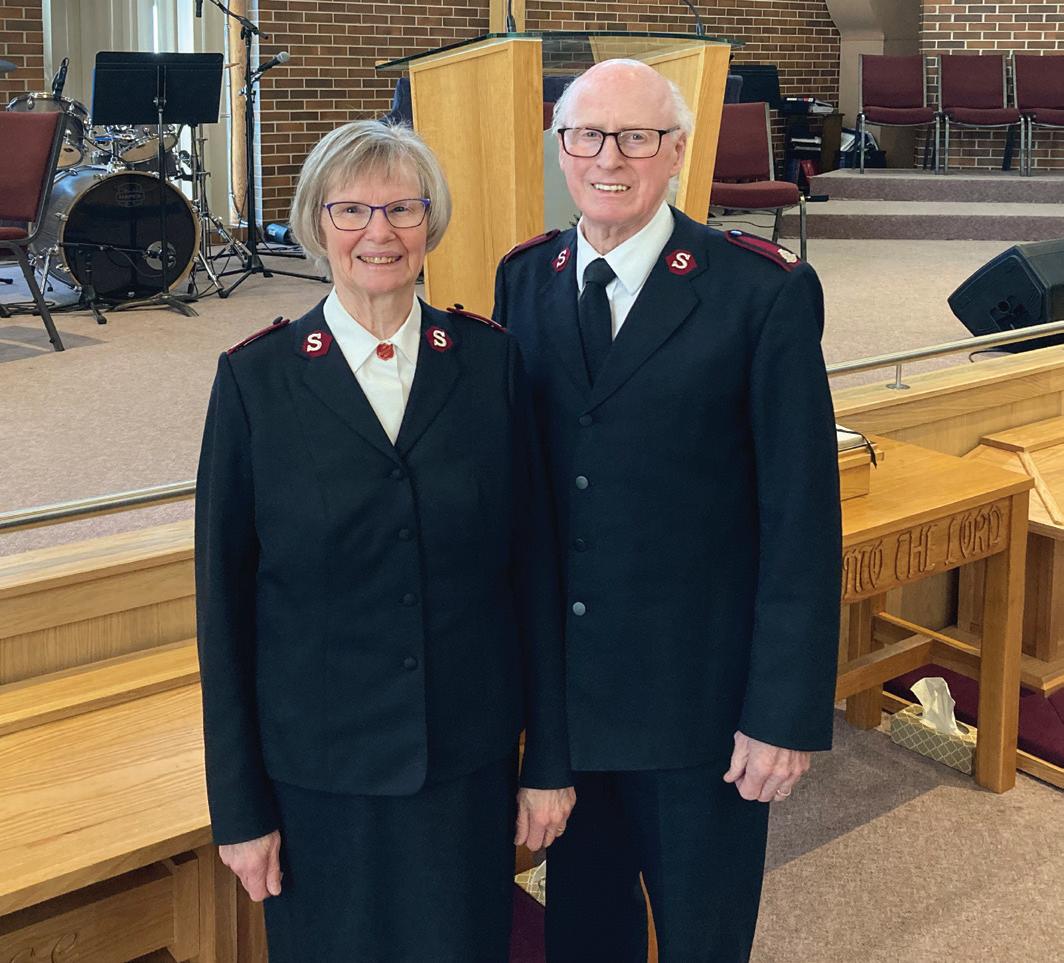
It wouldn’t surprise me if Salvationists across the territory are having the same conversation—with others, if not with themselves— today: What is the point of becoming an officer when I can serve the Army in other ways? Do I want to limit my freedom with respect to the places I serve, or the ways I serve? Do I want to place the life of my family at the mercy of decisions made by others? These are important questions to be asking. However, from the vantage point of living with them for 50 years, I would like to offer a personal response.
The word “ordination” means to place a person under orders by the church. However, that idea meets with strong resistance in our culture. The church, let alone the Christian faith, is under deep suspicion in this nation. Perhaps it’s because of this that I increasingly value the concept. As is true with many concepts, we learn their meaning by living them out. The meaning of ordination is something I have learned by living out my identity as a Salvation Army officer.
Ordination has come to help me understand the importance of tradition. For our first date in 1972, I took Cathie, now my wife, to see the film, Fiddler on the Roof. If you have seen the film you will recall one of its signature songs, Tradition! Like Tevye, the main character, and his daughters, 50 years ago I questioned the role of tradition within The Salvation Army. Over time, however, I have come to learn its importance. When the Winnipeg Jets step on the ice to play the Edmonton Oilers, they play the game out of its tradition, its embodied story. Past teams and players, changes in equipment, the ’72 Summit—all form the story, the tradition, of hockey. Any game played today expresses that tradition and leads to its ongoing life. Law is practised within a tradition, as is medicine. A Salvation Army officer is shaped by many traditions—above all, the tradition of the gospel as it has come to be embodied within The Salvation Army. This doesn’t mean simply repeating what has been done in the past; it does mean critically carrying the Army’s embodied story forward into our own culture.
Living under orders has meant learning to live in places I would not have chosen. I grew up in Hamilton, Ont., but began the journey of officership by living in Toronto. And, yes, I really did come to appreciate the capital of Ontario. Our appointments took us to the Prairies, where we came to appreciate their beauty and the hard work of farming. But moving to new appointments has not been without tears. We were appointed to Fort McMurray, Alta., soon after my father had suffered his second heart attack. I felt the distance. And it wasn’t easy leaving two young adult children in Toronto to continue their studies.
I didn’t want to become an officer. But after decades in this ministry, here’s why I’d do it again.
BY MAJOR RAY HARRISMjrs Cathie and Ray Harris
When I entered the College for Officer Training 50 years ago, I had little idea of the journey that lay ahead.
There has, however, been another side to this aspect of living under orders. Our last appointment, in St. John’s, N.L., was completely unexpected. We came to embrace the hospitality of Newfoundlanders, even if it meant kissing the cod! A few years ago, Cathie and I were in New York City when we learned that the musical, Come From Away, had just opened on Broadway. This musical portrays Newfoundland’s response to the diversion of planes because of 9/11. As we took in the performance, we sensed the audience’s enthusiastic response. Americans sitting beside us thanked us profusely. I don’t think my Newfoundland friends will mind knowing that we acknowledged the gratitude of Americans. Because of Salvation Army appointments, I have come to a deep appreciation and love for Canada. It’s a nation living with deep tensions, but I am committed to its life together. The appointment system has helped to shape my understanding of Canada.
One of the important dimensions of officership for me has been the Army’s core convictions, its doctrines. When cadets are ordained and commissioned, the Affirmation of Doctrines is an essential part of the service. After affirming these core convictions, cadets are asked by the presiding officer if they will faithfully teach these doctrines. Binding ourselves to believe certain convictions is deeply countercultural—surely we are free to believe what we want to believe. At some level, yes, we are. But what I have learned over the years is that Salvation Army doctrines have grounded me in the deepest convictions of the historic church. The early church created brief summaries of faith, called “ruled faith.”
Interesting things happen when a grandfather watches his grandson move through different levels of hockey. As the kids age, the rules change and the game changes. The rules are not the game, but they shape the game being played. Our Salvationist convictions shape the game we play, or at least they should. My plea is for a new generation of Salvationists, of ordained officers, who will take our core convictions and ask how they shape our response to climate change, racial hatred, refugees and the care of our cities and nation. Let’s imagine the ways that our mission is shaped by our core convictions.
Living under the orders of ordination has gifted me with a covenantal community. When we moved into the Toronto College for Officer Training as cadets in 1972, Cathie and I gained new neighbours. She never imagined having to study in our small one-room apartment while I had some of the guys in to watch a game of the Canada-Russia Summit Series. Over the years, this officer community has taken on a life of its own for me. We have mourned the losses affecting colleagues; we have cheered their accomplishments and encouraged those who lost heart; and we have shared hopes and frustrations.
One aspect of officership I have come to appreciate over the years is the Army’s approach to remuneration. As an officer, I do not negotiate remuneration. Whatever our level of education and responsibility of our appointments, officers are remunerated on the basis of length of service, not academic or professional credentials. And I appreciate this. The relationship of an officer to The Salvation Army is covenantal, not contractual. In his book, The Dignity of Difference, Rabbi Jonathan Sacks expresses the importance of covenant this way: “Covenant is an answer to the most fundamental question in the evolution of
societies: How can we establish relationships secure enough to become the basis of co-operation, without the use of economic, political or military power?” The covenant of Salvation Army officership holds implications for the life of our nation.
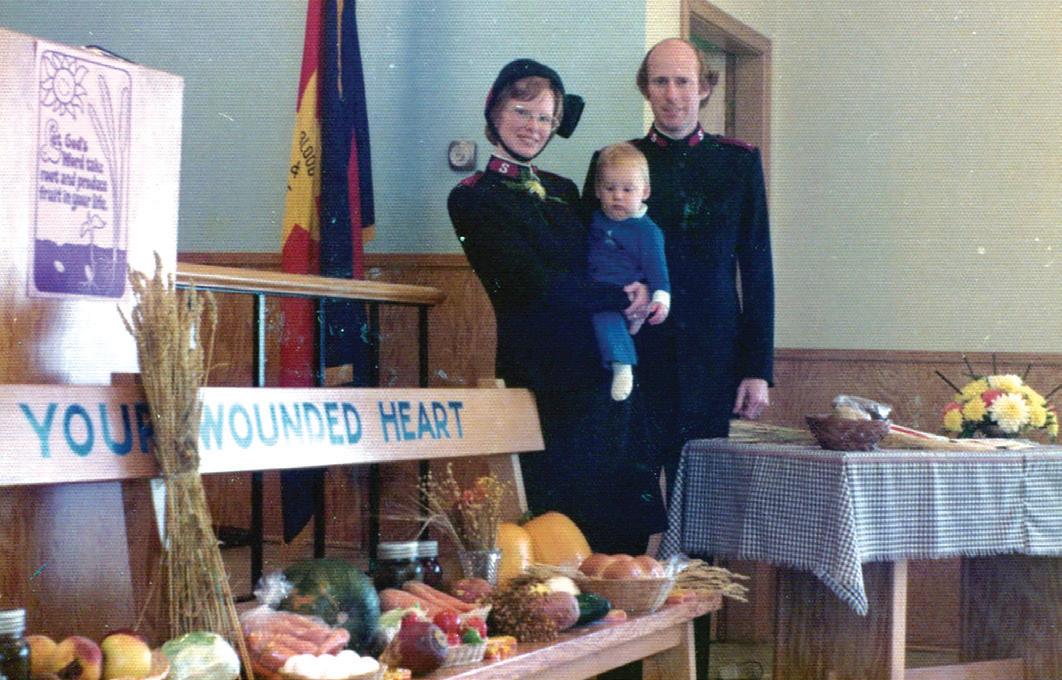
Yes, ordination and commissioning involve important limitations to what I wear, where I live and what I think. But during these 50 years, I have come to more fully understand that the God we know through Christ is the God who embraced limitations to accomplish our immense salvation. This is the thrust of Paul’s argument in his letter to the Philippians, when he unpacks his understanding of the mind of Christ, “who, though he was in the form of God, did not regard equality with God as something to be exploited, but emptied himself, taking the form of a slave” (Philippians 2:6-7 NRSV, emphasis mine). The word “emptied” means that God-in-Christ placed limitations on himself to achieve his saving purposes. The degree to which officership involves limitations only resonates with our deep convictions about the God we know through Christ.
When I entered the College for Officer Training 50 years ago, I had little idea of the journey that lay ahead. I am grateful for the patience my colleagues have had with me. I am grateful for the opportunities to engage in formal studies over the years. I am grateful for the trust placed in me by supervising officers. And I am deeply grateful for Cathie, with whom the covenant of marriage has informed my covenant of officership. I have yet to “finish the race,” but I sometimes imagine the moment when Clarence Wiseman and Ray Harris stand face to face again. And I can see this gracious man looking me in the eye with a gentle smile and saying, “Ray, I told you so.” I have a hunch he will be right.
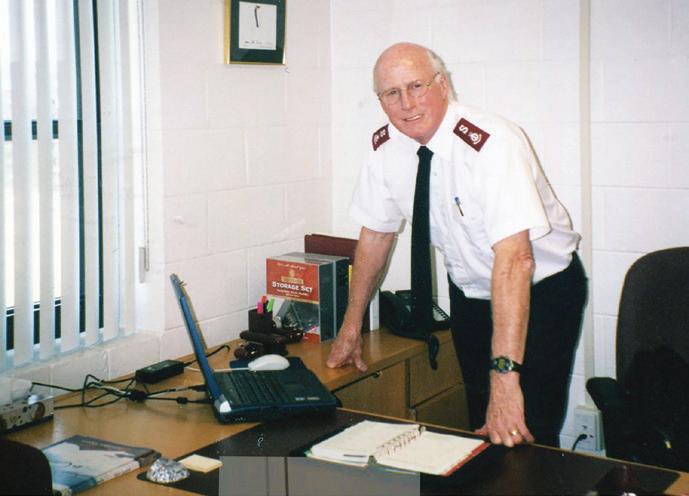
On May 18, the High Council will convene in London, England, at Sunbury Court Conference Centre to elect the 22nd international leader of The Salvation Army. I invite you to take a sneak peek past the closed door of the High Council chamber.
The current qualifying appointments for High Council membership are the Chief of the Staff, all active commissioners (with the exception of the spouse of the General), all territorial commanders and all territorial presidents of women’s ministries.
While territorial leaders will gather for the High Council, it is imperative to note that members of the High Council do not represent their territories. The High Council meets as a body of senior leaders from throughout the Army world.
Once the High Council commences, neither General Brian Peddle nor Commissioner Rosalie Peddle, our current international leaders, will have communication with members of the High Council except when he is alerted as voting commences and then privately informed of the General-elect’s identity.
Following confirmation by a legal advisor (not a member of the High Council) that the Council has been lawfully assembled with only eligible membership present, the Chief of the Staff will oversee the election of a president
by means of a voting procedure that will continue for subsequent elections for vice-president, chaplain and seven members of a questions committee. Four tellers will also be identified. After the president has been elected, the Chief of the Staff becomes a peer with the membership, and the president assumes leadership of the High Council.
The president’s responsibilities begin with a thorough review of the regulations governing the High Council. The president then leads the High Council through the process of amending and approving the Orders of Procedure—a process that can last for two days or more.
The central work of the High Council commences when the president announces that nominations for General will begin. Each step in the nomination and election process steadily proceeds unrushed. Those who are nominated and agree to stand for election become candidates for the office of General.
All other members of the High Council meet to debate and approve a list of questions for the candidates that have been fashioned by the questions committee. The group then adjourns for at least one full day in order to give candidates time to prepare responses to the questions that are then shared in printed form with all members.

Once a candidate submits replies to
the questions, the answers cannot be altered before or during the reading by the candidate to the High Council. The spouse of each married candidate is also given a lesser number of questions to answer. Following each presentation by the candidate and spouse, the floor is opened for clarification and follow-up questions.
When all candidates and spouses have delivered their prepared responses and answered follow-up questions, each candidate is given opportunity to deliver a speech. According to High Council records, the longest speech lasted just shy of one hour, and the shortest was less than four minutes.
The voting now begins. The candidate receiving the least votes after each ballot automatically drops from contention. All candidates have the option of withdrawing before the next ballot begins. A General is elected when he or she receives a two-thirds majority of the votes in the first through third ballots. If a fourth ballot is required, the General is elected by a simple majority of the members present.
At the close of the 20th High Council in late May or early June, Salvationists around the world will rejoice when the newly elected General is announced by the president of the High Council. Following the time of jubilation, may we join in united, fervent prayer for the
Lord’s anointed to lead and empower The Salvation Army to fulfil its Godordained mission “to preach the gospel of Jesus Christ and to meet human needs in his name without discrimination.”
For updates about the 2023 High Council, visit Salvationist.ca.
For an in-depth understanding of the history and functioning of the High Council, see 1929: A Crisis That Shaped The Salvation Army’s Future and Inside a High Council, both by General John Larsson.
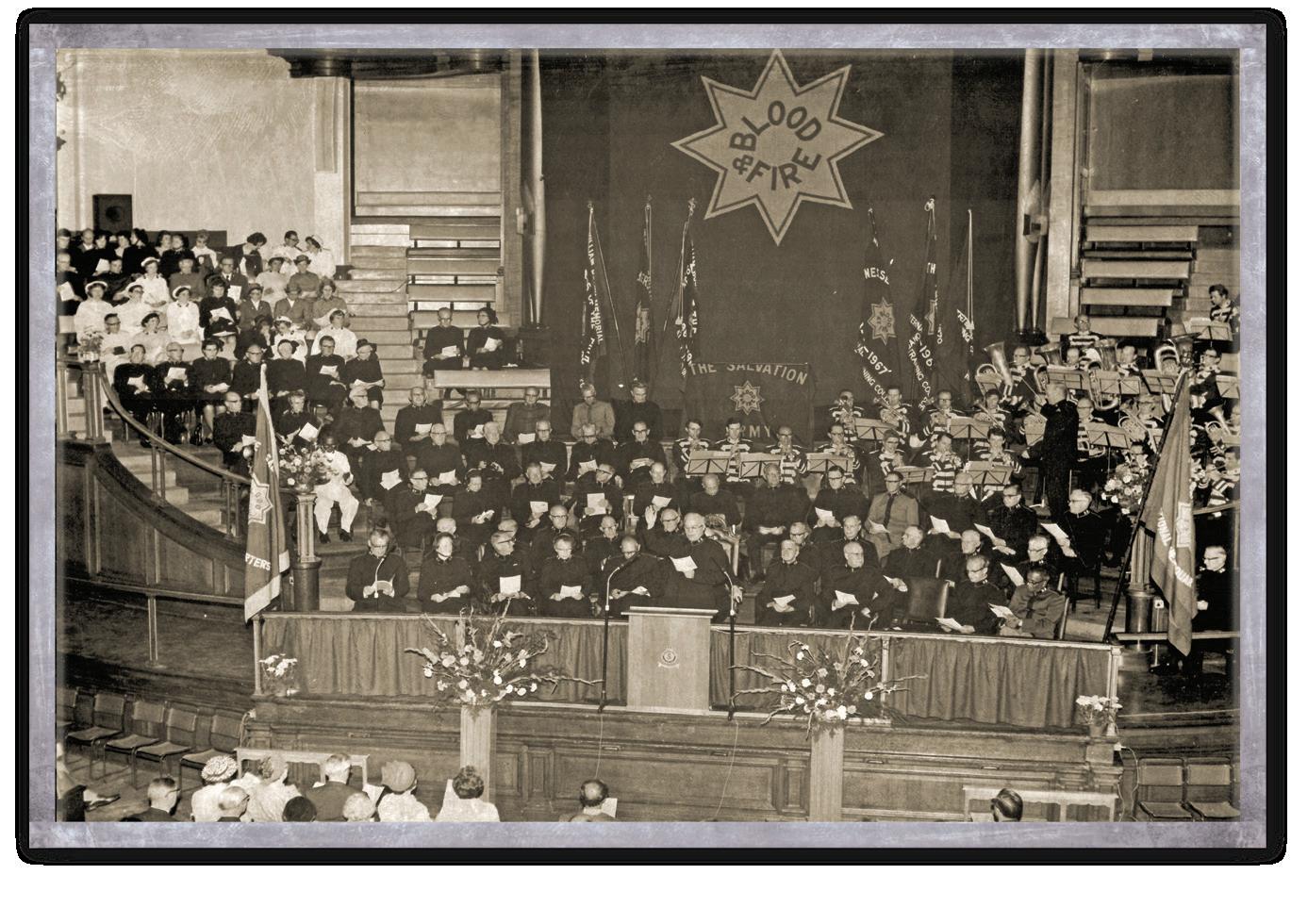
Commissioner William W. Francis, territorial commander in the Canada and Bermuda Territory from 2007 to 2011, was a member of two High Councils (2006 and 2011), and served as president of the High Council in 2011 before being nominated as a candidate for General. He leads an active retirement in Florida with his wife, Commissioner Marilyn D. Francis. Originally published in Salvationist ahead of the 2018 High Council, this article has been updated for 2023.

On Saturday, May 20, a welcome event will be held at Central Hall Westminster, giving Salvationists and supporters an opportunity to worship with High Council members and uphold them in prayer as the important task of electing the next General begins. The ministry of the current international leaders, General
World President of Women’s Ministries, will also be honoured, as they prepare to enter retirement. The event will feature contributions from many different Salvation Army musicians. The full event will be livestreamed at salvationarmy.org.
Participants receive much-needed support and enjoy fun activities at The Salvation Army’s Adult Day Services in Hamilton, Ont.

I’ll never forget that first time visiting. When we introduced my mom, whose name is Valerie, the staff broke into the song Valerie, and she laughed and joined right in. The day program played a huge part in increasing my mother’s quality of life.
This testimonial comes from the daughter of one of our former clients at The Salvation Army’s Adult Day Services in Hamilton, Ont., which has served seniors in the area since 2005. Our programs are designed for those who are living in the community but need extra support due to one or more of the following: frailty, social isolation, a progressive cognitive disorder such as Alzheimer’s or other dementias, or other chronic health conditions.
We provide a variety of programs and services in a structured and supervised setting, including therapeutic recreation, help with personal care, and social, cognitive, physical, emotional and spiritual support. Every day, we serve a nutritious hot meal at lunchtime. In addition to these services, we connect our members to Hamilton’s home and community care support services, to help them age safely in their homes.
Our goal is to create a safe environment where our participants receive the support they need to live with meaning and purpose. Aging brings changes in physical and mental capacity, but also many life transitions, such as retirement and the unfortunate reality of the death of friends or partners. A decrease in social connections can lead to isolation and loneliness. Every day, we witness the benefits of making new connections. It’s amazing to watch our members engage, share their journeys and contribute to each others’ well-being. Our hope is that engaging in such a way will bring them joy and improved wellness. Adult day programs are a place to belong.
We also offer caregiver support. Most of our caregivers want to help their loved ones age in their own homes for as long as possible. In some cases, caregivers find themselves providing around-the-clock care, while trying to maintain their own regular activities. Providing them with respite while their loved one attends our program reduces stress and helps them to live a more balanced life.
We often receive letters from the family members of those who attend our programs, expressing their gratitude. Valerie’s
daughter continued her testimonial this way:
Releasing a parent with Alzheimer’s into the care of strangers comes with its own set of problems and worries, because they often can’t recall all of the events of the day. Will she be safe? Scared? Taken advantage of? Cared for? It was scary, to be honest. We decided to take my mom with us for the tour and see how she felt in the environment. After the staff sang to her, she sang several songs and the staff seemed very impressed by her harmonizing while singing You Are My Sunshine.
It was such a warm and welcoming environment that we decided to give it a try. My mom was always up for going and whenever we popped in to pick her up, we saw first-hand how happy she was. She was participating in games, art activities, singing and dancing, and anything else they had planned for the day. It gave my family so much peace of mind to know that she was engaged, happy and safe. The staff always gave us such lovely feedback on her day, and it was clear that they genuinely cared for her. My father was able to get some well-needed rest and know that my mom was in good hands and being well cared for.
We cherish these testimonials as it shows we are fulfilling our mission to provide compassionate care and are making a positive impact in our community.
An early life lesson is to respect your elders. Our seniors come with life experience and wisdom, and we should listen to their voices and learn from them as we embrace the ever-changing future. Their knowledge goes far beyond looking something up on Google!
It is crucial for seniors to have access to positive experiences and to stay connected in our communities. While many of our members come to us during a time of hardship, it is a privilege to watch them flourish in our programs. We are all getting older. I hope this article brings hope as you age and encourages you to plan for the future. Stay connected. Our purpose in life is infinite.
This is the final article in our three-part series on aging.
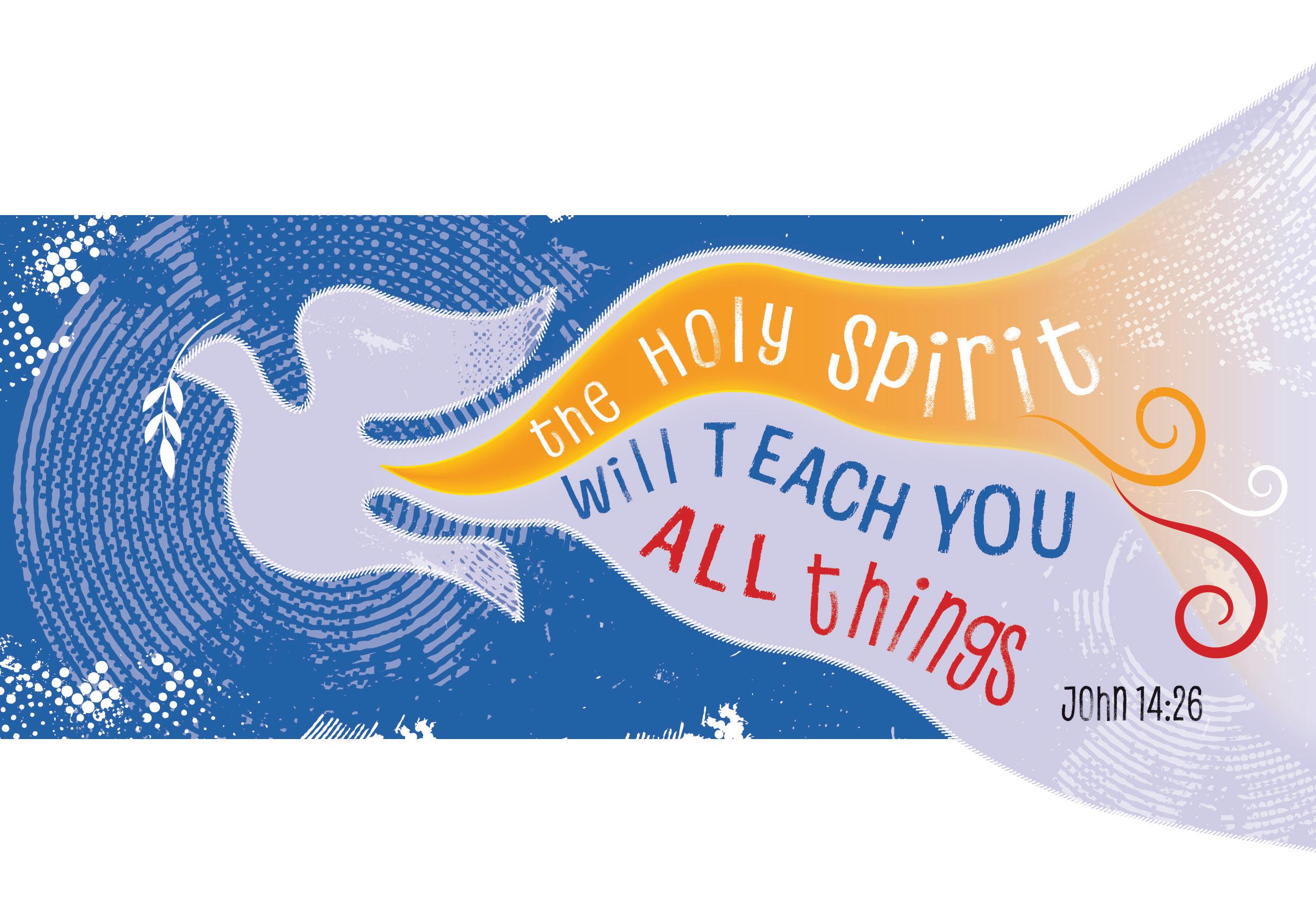 BY MAJOR STEVEN CAMERON
BY MAJOR STEVEN CAMERON
The Salvation Army was born when God called William and Catherine Booth to express the gospel of grace in new and innovative ways. This grace leads to salvation for the whole person. This grace leads to the transformation of our present existence and ushers in the first fruits of the kingdom of God. William Booth developed a theology and practice of sacramental living that has steered the Army for more than 150 years. Sacramental living emphasizes dwelling continually in the presence of God and abiding with Jesus in the power of the Spirit.
In this series, we are reflecting on themes from the Gospel of John. Just before the passage we are considering today, Jesus gave his disciples a new command, to “love one another” (John 13:34). Now, in John 14:15-31, which is part of his farewell discourse, he provides comfort and security for those who believe in him, considering the confusion and chaos that is going to take place in the next few days as he continues his journey toward the cross. He tells them, “Do not let your hearts be troubled and do not be afraid” (John 14:27). This comfort comes in the form of the third person of the Godhead (the Trinity), the Holy Spirit.
The passage has three significant aspects. The first is a focus on loving obedi-
ence. Jesus speaks of love as keeping his commands and obeying his teachings, and of love that comes from God and the love that he has for God. We understand that the foundational character of God is love and we are called to love God and to love others.
The second important aspect is that the Holy Spirit comes alongside us. Loving God and others is difficult, even with our best intentions. We need only look to Peter or Judas for an example of how love for Jesus did not reach the mark. This is where the Spirit comes in. The Spirit is given by God to help and teach us and remind us of everything Jesus said. The Spirit gives us the power to love even when it is difficult.
The third important aspect of these verses is the intimate relationship forged between God and believers. Jesus said, “My Father will love them, and we will come to them and make our home with them”
(John 14:23). In this fascinating teaching, he speaks about being in the Father and the disciples being in him and Jesus being in the disciples.
The Spirit who is with and in the disciples is the same Spirit who equips believers today for sacramental living. The Spirit abides in us and with us. This is an important aspect of discipleship. The Spirit embodies the presence of Jesus in the lives of believers. We come to real-
ize the great gift that God has given us through his Son, Jesus. In this abiding relationship, the Spirit makes it possible to live and embody the command of Jesus to love one another. Jesus said we would be known as his disciples by this love (see John 13:35).
Although Jesus is no longer with us on earth, we are not abandoned. The Spirit reminds us that we are children of God, called to abide in an intimate relationship with God the Father, God the Son and God the Holy Spirit. It is only by the Spirit’s power that we can live in this abiding relationship.
As we abide in relationship with Jesus, we embody the message of John’s Gospel. We live so that others may believe that Jesus is the Messiah, the Son of God, and that by believing they may have life in his name. This is sacramental living. By the Spirit’s power we proclaim and act out this reality of grace.
This is the third article in a five-part series on sacramental living. Articles will be published monthly, alternating in print and online at Salvationist.ca.
mission. Legal matters guard our ability to operate in Canada and Bermuda. Information technology simplifies systems to free people to serve their communities.
Recently, I was given the phrase “relentless hope.” This is what we have. When we say, “Giving Hope Today,” The Salvation Army’s brilliant brand promise, what we are giving, what we are sharing, what we are talking about, is Jesus Christ, the hope of the world, the God of all hope.
We are people of relentless hope. We do not believe that it is too late for anyone. We do not believe that anyone is too far from redemption. We do not believe that God is limited in his ability to change lives. Every day across this land, we see evidence that God is at work.
As I prepare to retire this August, I look back on my appointment as territorial secretary for business administration with great gratitude. I found it a place of great teamwork and joy. In my last Perspectives column, I want to share why I look forward to the future of The Salvation Army with hope.
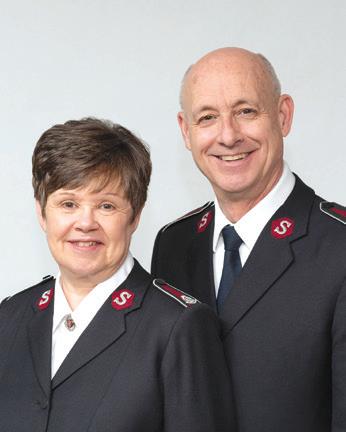

Recent reports from Asbury University, a private Christian university in Wilmore, Kentucky, have highlighted a move of the Holy Spirit that some are calling a revival, but perhaps might more accurately be called an awakening. An ordinary chapel service began but never ended, with worship and prayer continuing for two weeks. This awakening seems to be spreading to other campuses. Maybe you are praying, as I am, Do it in my neighbourhood, Lord. Do it here, do it now.
I am a product of a similar awakening in the 1970s, a revival that emerged from that same campus and spread across many churches and denominations, taking root in Toronto’s Scarborough Citadel, where I was a teenager. The Holy Spirit clearly moved and broke out in ways that transformed lives and families. Those days remain etched in my memory and the work of the Spirit remains firmly planted in my heart.
At the most recent mission delivery leaders’ forum in Montreal, there was a real sense among the divisional leaders and those of us from territorial headquarters that the faith, prayer and strategy of our people is resulting in some new and refreshing expressions of ministry. It made me think, Maybe I shouldn’t be retiring!
As I have worked in the field of business administration during this last part of my active officer journey, I have always supported our mission in prayer, believing that faith is as important, if not more important, than the facts before us. The biblical record demonstrates this. The small offering of two loaves and five fish fed 5,000 men, not including women and children (see Matthew 14:13-21). The mighty force of Egypt was overcome by a man with a staff who was sent to challenge Pharoah (see Exodus 5-11). I could go on.
We must deal with facts—there are budgets to prepare, roofs to fix, technology to update. And yet, at the same time, we can’t always explain the things that happen except to say that God was, or is, at work.
Property is about a place to facilitate ministry. Finance is about fuelling the
I believe that the good leaders and talented and committed people who are part of The Salvation Army in Canada and Bermuda are God’s provision. Sometimes I wonder if we see that in ourselves.
Forty years ago, when my wife, Wendy, and I were preparing to become officers, we needed to move an obstacle out of the way. We agreed in prayer to ask God to deal with it, without telling anyone what the hurdle was. Within days this issue was dealt with and we moved forward in faith. You can tell me it was a coincidence, but isn’t it interesting how often God is in the middle of coincidences?
I believe that resilient faith is necessary in a world that tends to challenge us on every front. And I believe that as we work together, we, too, can see an awakening—not just on university campuses or even in our corps. I believe that this awakening is happening in the lives of the people who say, “I am a Salvationist.”
There are a few very good meals I will remember for the rest of my life. An Italian feast I enjoyed aboard a cruise ship in the Mediterranean. Chicken quinoa soup prepared over a wood-fed stove in Peru. My dad’s nasi goreng (Indonesian fried rice), prepared the way my oma taught him. Mmm.
But most of the meals I’ve eaten—thousands and thousands of them— have been unremarkable. If you asked me what I ate last Monday, I probably couldn’t tell you (though I can almost assure you I ate tacos on Tuesday!).
While eating is one of life’s great joys, it is also a necessity of life. Food nourishes us. It fuels our bodies. It keeps us alive. And while sometimes we splurge on a fancy meal, it’s more likely that we reach for ingredients that are inexpensive and easy to prepare.
Our food and our faith have much in common. Jesus calls himself the Bread of Life. His body, broken bread, and his Word, our daily bread. As we seek nourishment for our bodies in three square meals a day, we also seek nourishment for our souls in times of corporate worship and personal prayer and the reading of Scripture.
Just as the food industry emphasizes extravagance—evidenced by the programming on the Food Network— evangelical Christianity tends to focus on moments of spiritual ecstasy. We live for packed altar calls, tear-filled prayer meetings and exotic mission trips.
We come by it honestly enough. We thrive on stories like that of John Wesley’s Aldersgate experience when he “felt his heart strangely warmed” by the Holy Spirit, or the more recent revival at Asbury University in Wilmore, Kentucky. I know there is great anticipation as we approach INSPIRE, the territorial confer-
ence and congress taking place this June. And while powerful spiritual experiences are a gift when they come, they cannot be the point of Christian spirituality, or we will find ourselves increasingly disillusioned with our everyday spiritual fare.
quietly feeds our souls. It nourishes our hearts and gives us faith and hope to endure each new day. If you asked me what Bible verse my devotional was based on last Monday, I probably couldn’t tell you, but it still kept me fed. We eat even when we don’t want to, even when the meal before us doesn’t excite us, because we know that we need to. Last summer, I contracted COVID-19, the Omicron strain of the virus that often robs its victims of their sense of taste for several days. Eating lost its joy, and yet I continued to chew through my food because I knew my body needed the nutrients to sustain and heal me.
Similarly, there are times when we will approach worship or the Bible and find it equally unpalatable. Sure, there will be sermons we remember, worship songs that speak to our hearts and beloved Bible verses we can recite from memory. But there will also be sermons that leave us unenthused, worship songs that don’t resonate and Bible passages that seem as unappetizing as stale bread, leaving us with more questions than answers.
How should we respond when we find worship or the Word perplexing, boring or unappealing? We keep eating. We receive nourishment. We keep listening, learning and eating our daily bread. We wait on God to give us what we need to sustain us for one more day.
So, give us this day, our daily bread. And help us to receive our nourishment with gratitude, whether it’s warmed up leftovers or gourmet fare, because both are a gift of provision for body and soul.
Even when it seems routine, mundane or even boring—a peanut butter sandwich for lunch, again?—corporate worship, reading the Bible and even saying grace

How should we respond when we find worship or the Word perplexing, boring or unappealing?
Become
RICHMOND HILL, ONT.—Richmond Hill CC is awarded a certificate for Non-Profit Sector Appreciation Week 2023, recognizing the work of The Salvation Army in Richmond Hill. From left, Mary Halbert, CFS manager; Daisy Wai, member of provincial parliament for Richmond Hill; Mjr Krista Andrews, CO; Michael Parsa, member of provincial parliament for Aurora—Oak Ridges—Richmond Hill; and Aux-Lt Elahe Bagheri, assistant CO, Persian ministries.
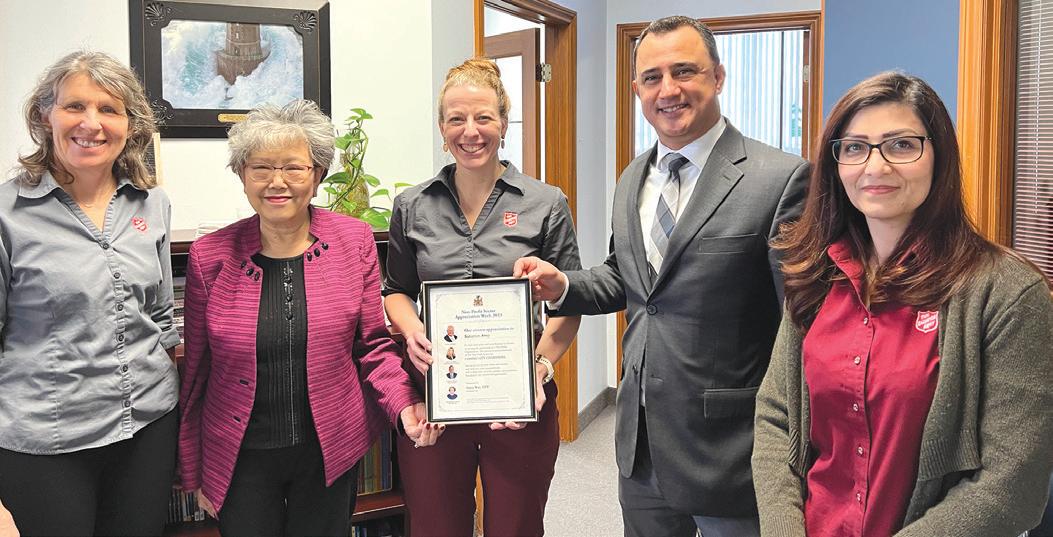
DILDO, N.L.—Glen Reid celebrates retirement after 24 years of local officer leadership as CSM at Trinity Bay South Corps. From left, Mjr Rene Loveless, CO; Glen Reid; and Mjr Wanda Loveless, CO.
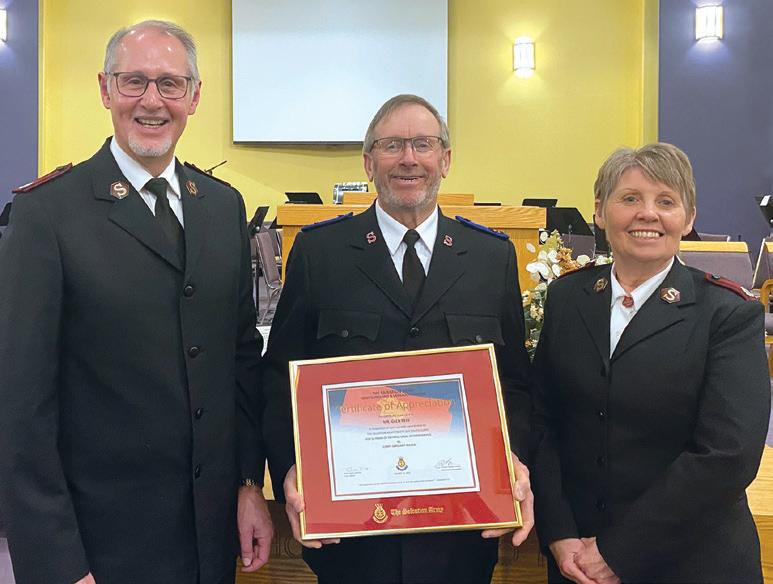
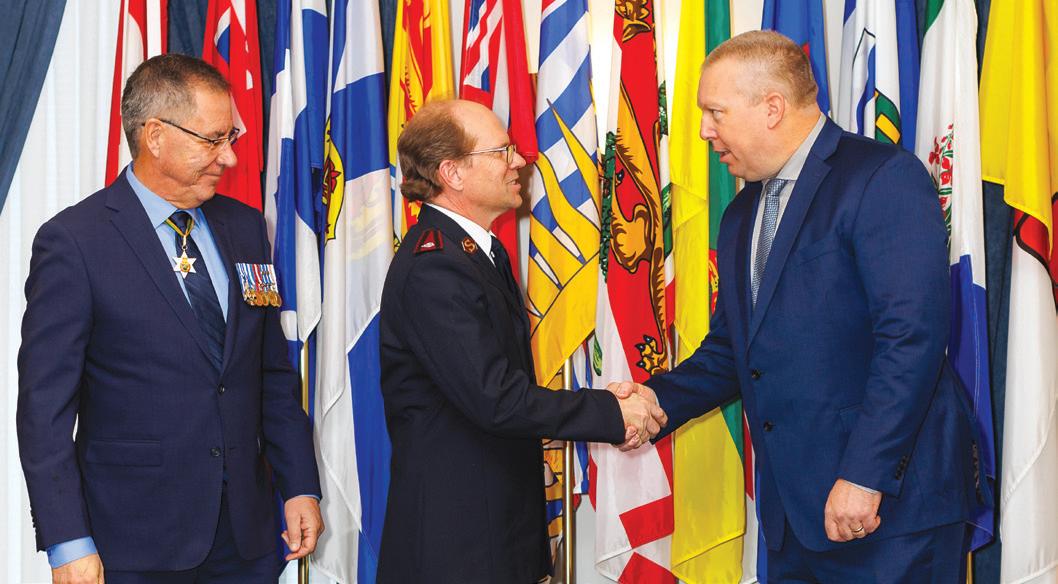
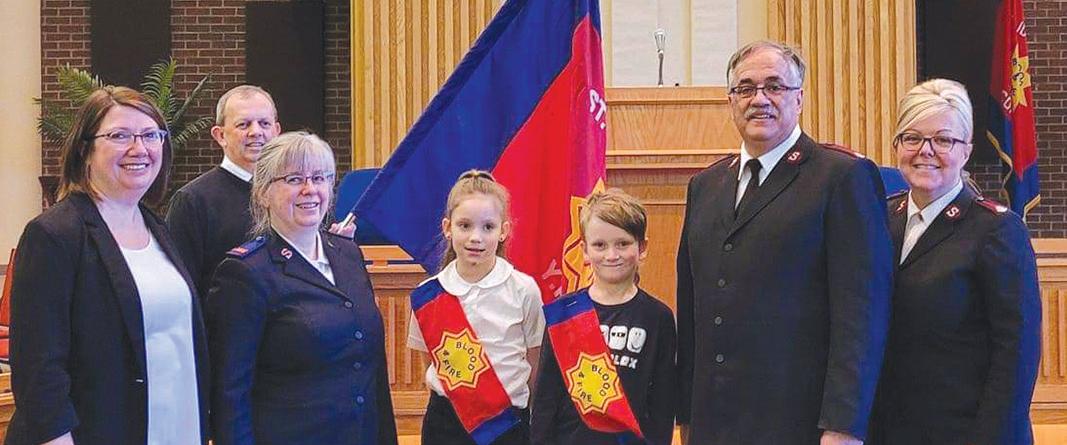
With your sponsorship, children and youth in more than 20 countries are attending school, receiving regular meals and living in safe accommodations




HAMILTON, BERMUDA—Celine Barnes, a junior soldier at North Street Citadel in Hamilton, Bermuda, attends a book signing for Fudgesicle by Tinee Furbert. Fudgesicle is a story that empowers girls of colour to embrace and love their natural skin tones. Barnes’ hairstyle inspired the main character, Novi, featured on the book’s front cover.

Appointments: Mjrs Christian/Christiana Azubuike, CS/TSWM, Nigeria Tty, with rank of lt-col ; Jun 1—Mjr Elizabeth Nelson, TC, Bangladesh Tty, with rank of lt-col
Marriage: Cdt Jennifer Hale to Lt Matthew Rideout, Jan 1
Appointments: Mjrs Doreen/Ross Grandy, COs (pro tem), Faith and Hope Corps, Marystown, N.L. Div; Mjr Jeffrey Johnston, CO (pro tem), Thunder Bay CC, Ont. Div; Mjr Cory Pinksen, officer personnel secretary—operations, THQ; Mjr Colleen Winter, associate CO, Kelowna CC, B.C. Div
Post-retirement ministry: Mjr Norman Garcia, CO, Meadowlands, Hamilton, Ont. Div
Promoted to glory: Lt-Col Douglas Moore, Dec 24; Mjr Ernest Reid, Jan 9; Mrs. Brg Sadie Turnbull-Thomason, Jan 13; Mjr Karen Holland, Feb 3; Mjr Val Redner, Feb 16; Mjr Jacob Smith, Feb 21; Mjr Marjory (Peddle) Earl, Feb 27; Mjr George Swaddling, Feb 27
Commissioners Floyd and Tracey Tidd: May 1-7 Holiness Institute, Winnipeg; May 7-11 Mission Delivery Leaders Forum, Ottawa; May 11-12 National Advisory Board, Ottawa; May 17-Jun 3 High Council, Sunbury Court, Sunbury-on-Thames, England; Jun 8 ribbon cutting, Grace Village, Edmonton; Jun 25 Covenant Day, CFOT, Winnipeg; Jun 26-Jul 2 INSPIRE Conference and Congress, Toronto
Colonel Evie Diaz: May 1 Booth University College board of trustees meetings, Winnipeg; May 1 Holiness Institute, Winnipeg; May 7-11 Mission Delivery Leaders Forum, Ottawa; May 11-12 National Advisory Board, Ottawa; May 26-28 135th anniversary celebrations, St. John’s Citadel, N.L.; Jun 9-11 congress and commissioning, U.S.A. Central Tty; Jun 25 Covenant Day, CFOT, Winnipeg; Jun 26-Jul 2 INSPIRE Conference and Congress, Toronto
Canadian Staff Band: May 6 Festival 54, Guelph Citadel, Ont.; Jun 30-Jul 2 INSPIRE Congress, Toronto
Canadian Staff Songsters: Jun 30-Jul 2 INSPIRE Congress, Toronto
SURREY, B.C.—Major Penny Lang worked as a registered nurse at the Winnipeg Grace Hospital and when the officer chaplains at the hospital befriended her, she began attending The Salvation Army and became a soldier. She received the call to officership and entered the Messengers of Joy Session in 1990. After she was commissioned, she served in The Salvation Army’s health services across Canada, later accepting international appointments in Jamaica and Zambia. She was a quiet and caring person, and her ministry with seniors and staff was greatly appreciated. When she returned from overseas, she formed a close friendship with Major Avril Halsey. In her retirement, she moved to Surrey, and attended the White Rock Corps. A lover of music, she enjoyed playing in the British Columbia Reservist Band. She leaves behind many memories with those whose lives she touched. She will be missed by Major Avril Halsey and Anney Campbell, another close Salvationist friend, who became her family.
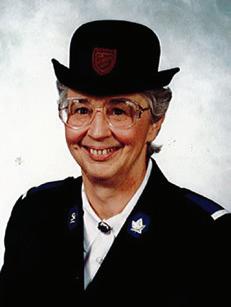
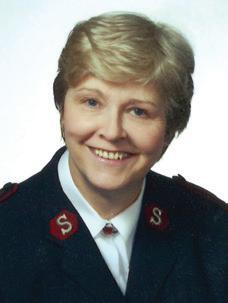
TWILLINGATE, N.L.—Blanche Roberts was born in 1932 and gave her heart to the Lord at a very young age. Serving him faithfully for the remainder of her life, Blanche loved going to church and was enrolled as a soldier of the Twillingate Corps in 1947. She was a member of the songsters and home league and served as treasurer for community care ministries. Blanche was also a Sunday school teacher for many years. She was passionate about visiting the sick and shut-ins, praying with and encouraging them. In her daily life, she exemplified the love of God in her quiet and gentle way and was a prayer warrior for her last two years while at home. Blanche leaves with loving and cherished memories sons Ernie (Effie), Garry (Rosalind) and Ivan (Gloria); daughter, Kathy (Danny); six grandchildren; four great-grandchildren; sister, Major Juanita (Baxter) Canning; sister-in-law, Joyce Randell; and many more family members and friends.
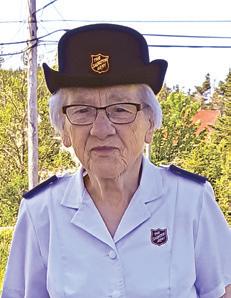
OSHAWA, ONT.—Major John Walter Gordon Gerard was born in Pictou, N.S., in 1933. He grew up in Saskatchewan attending corps in Regina, Saskatoon and Prince Albert where he enjoyed playing in the band. Out of Vancouver Temple, he entered the training college in St. John’s, N.L., and was commissioned in 1959 as part of the Pioneers Session. During his time there, he met the love of his life, Lorraine Rideout. Their first appointment was opening The Salvation Army in Labrador City, N.L. They served in various ministry appointments across the country, including in Newfoundland and Labrador, Ontario and British Columbia, and John spent 14 years at territorial headquarters in finance and property. One of his favourite appointments was as administrator of the men’s social centre in Thunder Bay, Ont. John leaves behind his wife of 61 years, Lorraine; children Joy, David, Glenn, Lisa (Kevin), Charles (Dara-Lynn) and their families; 14 grandchildren; three great-grandchildren; siblings Nancy and Ruth (Alan); and many members of his extended family. Sadly, the day after John died, his son-in-law, Charlie (Joy), was also promoted to glory.
BRAMPTON, ONT.—Lillian May Kurtz was born in 1932 and was a lifetime member of The Salvation Army Brampton Corps where she played in the band, sang in the songsters and taught Sunday school. Lillian worked at family services in Brampton for 30 years until her retirement in 1999. She is loved and missed by her husband, Ken Kurtz, and many nieces, nephews and friends.
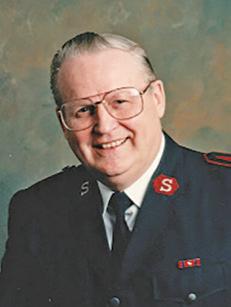
To me, The Salvation Army is special in that it reaches out and connects with the lowly, the marginalized and the underprivileged,” says Mary Milne. But for her, the reason is more personal and deeply felt. “They accepted and welcomed the outcast.”
“
refused, but he persisted.
So, on Easter Sunday 2017, Mary walked into The Salvation Army’s Sudbury Community Church—and she loved it.
When Mary was 20, she and her brother decided to check out the local churches in the Sudbury, Ont., area.
“Our family believed in the Bible, but not in church,” she explains. “I’m not sure what inspired it, but I think we just decided to be naughty!”
While Mary’s brother chose the Salvation Army church, she attended another denomination. But when she walked through their doors, she was taken aback.
“I was a farm girl,” she smiles, “and I dressed like a farm girl. I’m sandwiched in between six brothers, three younger, three older. My older sisters had already left, so I was dressed in boys’ clothes, hand-me-downs. And everyone at that church had fancy suits and ties and dresses and jewelry and makeup. I felt out of place—and the congregation made sure I knew that.”
Mary left and never wanted to set foot in a church again.
Mary’s brother had had a different experience at the Salvation Army church.
“He’s a big, tough guy,” she says. “You don’t tell him what to do or where to go. But at the end of the service, he shook the pastor’s hand and said that he’d be back next week—and he was.”
Mary’s brother tried to persuade her to go with him to church. At first, she
“There were people there in jeans and sweatpants. I felt at home, as if I was accepted for who I was.”
When Mary moved in with her brother that December, she began attending The Salvation Army regularly.
A little later, in May 2018, she became a Christian after some evangelists had explained the gospel message in a way she had never heard before.
Terence Hale,” Mary says of the officer who currently serves at the Centre of Hope in Halifax. “I randomly friended him, and he accepted my friend request, even though he had absolutely no idea who I was. I felt God call me through that article.”
That message encouraged her to seek out more information on Salvation Army history and doctrine, which, in turn, led her to a job as an intake worker two years later for The Salvation Army in Sudbury. In 2019, she became a soldier and, after serving with the Army’s camping ministry in Ontario, was enrolled in The Salvation Army’s ministry placement program.
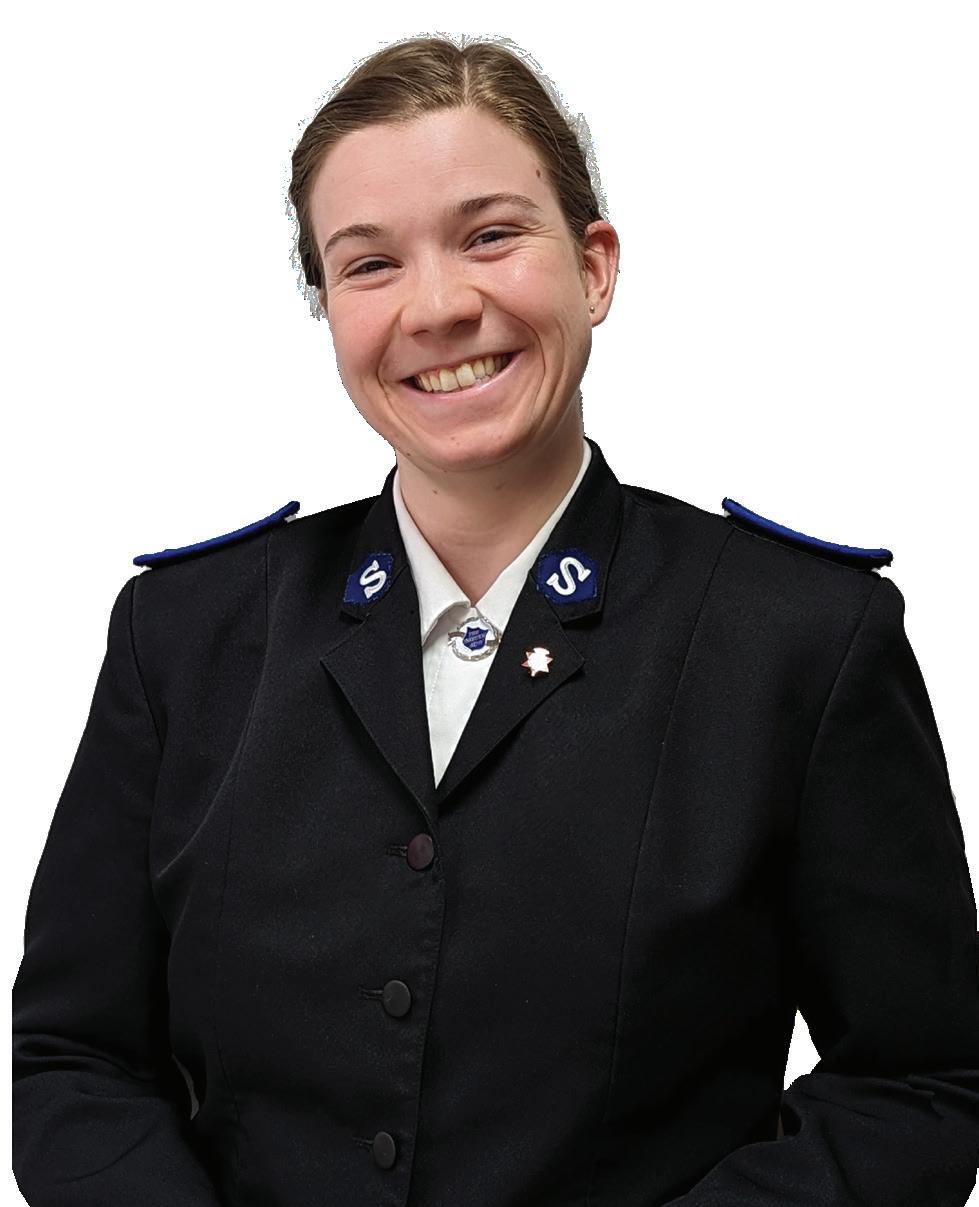
“It’s a love that is beyond my words to articulate,” she says. “God changed my life. There’s no other way to put it.”
Mary sampled other churches but continued to attend The Salvation Army.
“I’ve tried other denominations just to see what they were like,” she says, “but I really felt that God was calling me to The Salvation Army. I felt that’s where I belonged.”
“I was scrolling through social media one day and came across an article by Major
“I am shadowing Captains Carolina and Johnny Valencia, the corps officers at Toronto’s Scarborough Citadel,” says Mary.
“They’re wonderful mentors. I’ve had the privilege of being able to have difficult conversations with them, and I’ve gotten practical experience in officership. It’s good knowledge and good education.”
Mary hopes to be accepted as a candidate for officership in the near future.
“I feel that God has done a tremendous amount through the Army for me, and I feel that God has called me within the Army to be an officer. I don’t know any better way to put it.”
Mary Milne never wanted to set foot in a church again, but then she discovered The Salvation Army.
KEN RAMSTEADMary Milne
“God has called me within the Army to be an officer.”
—Mary Milne
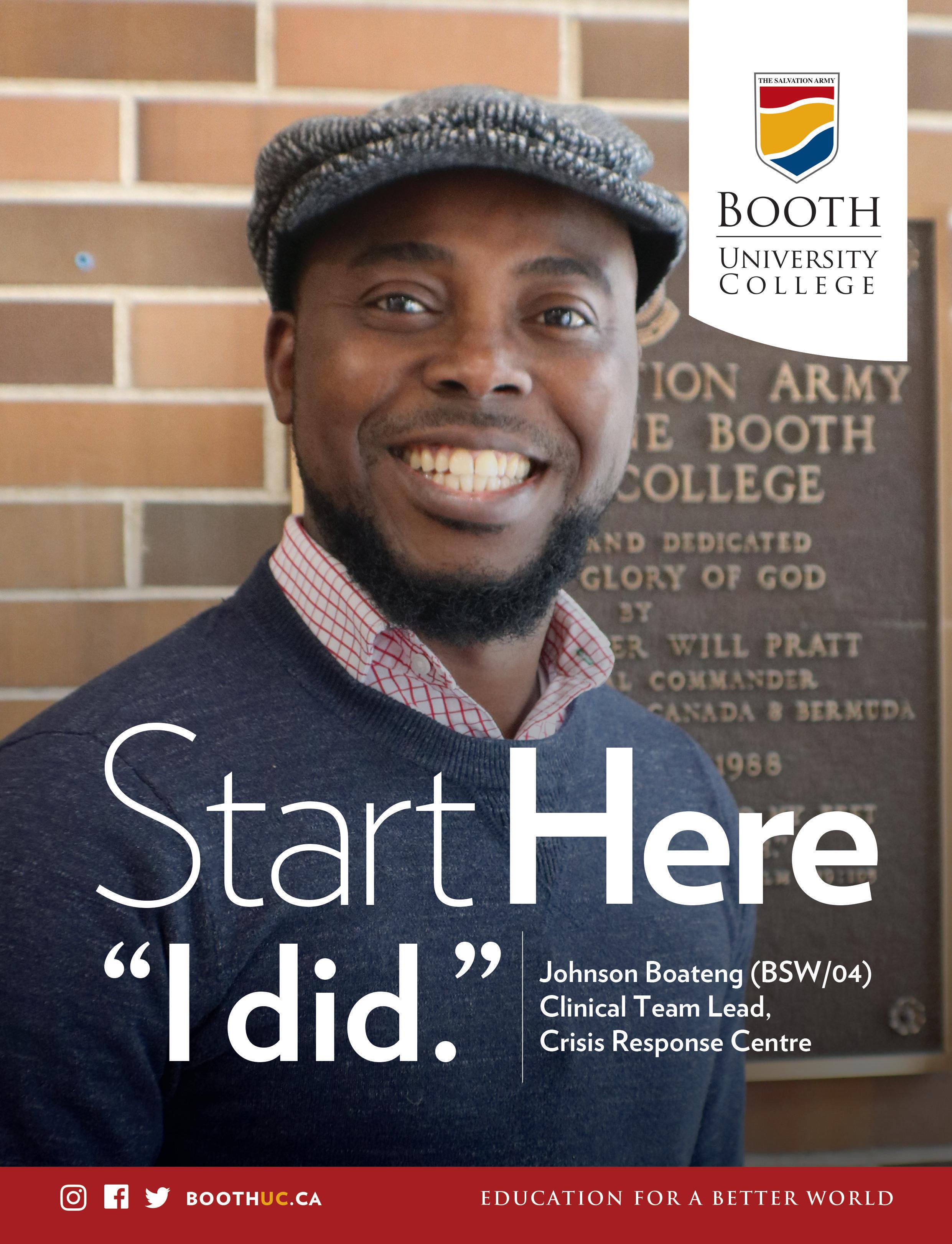

NBA POWER FORWARD TAUREAN PRINCE OF THE MINNESOTA TIMBERWOLVES HAS AN ATTITUDE OF GRATITUDE, ESPECIALLY WHERE THE SALVATION ARMY IS CONCERNED. P.16

Have you ever watched a quiz show and thought, I could do that ?

Of course, it’s one thing to answer trivia questions from the comfort of your couch; it’s another to be on stage, bright lights shining, clock ticking, thousands of dollars on the line.
Facts can be memorized and—if you’re lucky—recalled on the spot. But when life throws difficult questions and situations our way, the right answer isn’t always obvious.
Thankfully, God promises to guide us. James 1:5 says, “If any of you lacks wisdom, you should ask God, who gives generously to all without finding fault, and it will be given to you.”
Staying on the right path, with God’s help, is the ultimate grand prize.
To learn more about how God can guide you, visit our website at faithandfriends.ca or contact us at The Salvation Army Editorial Department, 2 Overlea Blvd., Toronto ON M4H 1P4.
: Tartila /stock.Adobe.com
Illustration14
FAMILY TIME
5 Time to Just Be
Setting children on the right path in life.

25 & COUNTING
8 The Fortune Cookie
To mark our first quarter century, Faith & Friends is featuring past articles that have impacted YOU, our readers. Tell us yours!
BAD TO THE BONE?
12 Moses: From Cowardly to Courageous
How God took a wimp and made him a miracle worker who freed God’s people from slavery.
Jesus Revolution is more than a movie; it’s an invitation to experience revival.

16
The NBA’s Taurean Prince has an attitude of gratitude, especially where The Salvation Army is concerned.

Joseph Lauren made a promise to God, but would he live long enough to deliver on it?
FAITH BUILDERS
26 The Things We Do for Love
In The Little Mermaid, will Ariel regret the trade she made?
LITE STUFF
28 Eating Healthy With Erin Sudoku, Quick Quiz.
NIFTY THRIFTY
30 Fun With Food
When hosting your next party, consider the cuisine as part of the décor.
It was the stuff dreams are made of. A young fan had flown 7,089 kilometres from Argentina just to see Miami Heat star Jimmy Butler in action in a regular season game.
But imagine 12-year-old Felipe’s mortification when he learned that Jimmy was a late scratch for a game against the Boston Celtics.
The moment Felipe and his sister, Zoe, found out that the star forward was a no-show was captured on national television. It was a heartbreaking sight.
However, the story had a happy ending. When Jimmy and the Heat found out what happened, the team gifted Felipe with a brand-new Butler jersey and gave him on-court access, which led to a photo op with Heat point guard Gabe Vincent.
Jimmy addressed the gesture on Instagram, captioning the photo of the interaction: “I got you.”
Jimmy is not the only NBA player who looks out for others. In this month ’ s Faith & Friends, writer Jayne Thurber-Smith profiles Minnesota Timberwolves power forward Taurean Prince. With the help of The Salvation Army, he goes above and beyond to help those less fortunate.
“Giving is the number one rule to receiving,” he says. That’s a rule we should never break.
Read about Taurean on page 16.
Elsewhere, you’ll see how one father decided to let his daughter set the pace, discover why a neardeadly prison altercation saved a man’s life instead of ending it forever, and read about the Jesus Revolution, a real movement that swept the continent in the 1960s and ’70s.
Ken RamsteadMission Statement
To show Christ at work in the lives of real people, and to provide spiritual resources for those who are new to the Christian faith.
Faith & Friends is published bimonthly by:
The Salvation Army
2 Overlea Blvd, Toronto Ontario, M4H 1P4
International Headquarters 101 Queen Victoria Street, London, EC4P 4EP, England
Brian Peddle, GENERAL Commissioner Floyd Tidd
TERRITORIAL COMMANDER
Lt-Colonel John P. Murray
SECRETARY FOR COMMUNICATIONS
Geoff Moulton, DIRECTOR OF INTERNAL COMMUNICATIONS, EDITOR-IN-CHIEF AND LITERARY SECRETARY
Pamela Richardson
ASSISTANT EDITOR-IN-CHIEF
Ken Ramstead, EDITOR
Kristin Ostensen
MANAGING EDITOR OF SALVATIONIST AND SALVATIONIST.CA
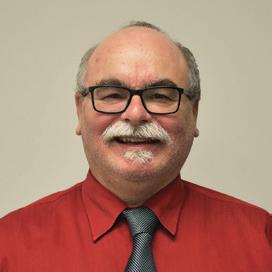
Lisa Suroso
GRAPHIC DESIGN SPECIALIST
Rivonny Luchas
DIGITAL MEDIA SPECIALIST
Ada Leung
CIRCULATION CO-ORDINATOR
Giselle Randall, Abbigail Oliver STAFF WRITERS
Scripture Unless otherwise indicated, all Scripture references are taken from New International Version
Contact Us
P. (416) 467-3188, F. (416) 422-6217
Websites
faithandfriends.ca, salvationist.ca, salvationarmy.ca
faithandfriends@salvationarmy.ca
Subscription for one year:
Canada $17 (includes GST/HST);
U.S. $22; foreign $24
P. (416) 422-6119
circulation@ salvationarmy.ca
All articles are copyright The Salvation Army Canada & Bermuda and cannot be reproduced without permission.
Publications Mail
Agreement No. 40064794
ISSN 1702-0131
When my daughter was preschool age, I would often take her to the stores with me to run some errands.

The short journey by car often involved heavy traffic and parking chaos, so I preferred the 15-minute walk. The route took us along a winding path by a creek and through a nature reserve full of flowers before arriving at the shopping centre.
I always seemed to be in a hurry so, hand-in-hand, we would make
the journey in quick time, my poor daughter at a trot as I almost dragged her along. Sometimes, I’d lift her onto my shoulders to make it quicker. My aim was always to be back home within the hour.
Over time, my daughter started showing signs of reluctance to accompany me on my “quick trips.” I asked her why. With a sagging head, she mumbled, “Because you’re always in charge, and you don’t let me pick daisies on the way.”
My next trip to the stores was on a Saturday. I had time. So, I decided to allow my daughter to be “in charge” and perhaps pick some daisies on the way.
So off we set. If I’d recorded the route on a GPS tracker, it would have looked like a plate of spaghetti. My daughter delighted in exploring every form of flora and fauna along the way, meticulously picking dozens of daisies before sitting contently on a bed of clover and making a daisy chain. She then followed a trail of ants on her hands and knees, chased numerous butterflies, waded into the creek up to her knees to watch tadpoles go about their business and said a sweet hello to every passerby. She soaked up every nuance and experience that the path offered, and time was irrelevant.
We finally made it to the stores. I carried out my list of errands, and then the return journey followed the same meandering pattern. The whole exercise took four hours.
But it was the most precious four hours of my life. To see my busy little daughter in her element— exploring anything and everything that caught her eye—was an endearing experience I’ll never forget
And we chatted. She told me about her little life—her friends, her joys, her sorrows, what she was reading, what food she liked and didn’t like, how she was coping with her new little brother.
Over those four hours, I realized that I connected with my fouryear-old daughter as I had never connected before. All because I gave her time to be. Just to be. That memorable journey set the pattern for a relationship with my daughter throughout her childhood.
The Bible says, “Start children off on the way they should go, and even when they are old they will not turn from it” (Proverbs 22:6).
As a father with a strong faith in God, I learned early that I would play
“To see my busy little daughter in her element—exploring anything and everything that caught her eye—was an endearing experience I’ll never forget.”
DEAN SIMPSON
a vital role in how my children saw the world and understood right from wrong. Spending quality time and building a solid relationship based on biblical principles was part of that.
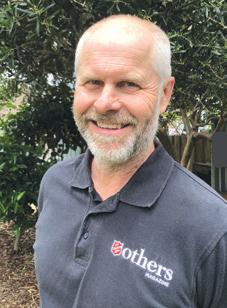
When she was born, I couldn’t know what challenges and experiences my daughter would face on the path of life, and I couldn’t control how she acted. But one thing I could do was start her on that path and trust that she will not turn from it.

My daughter is now a young adult. Every now and then, we hang out. Just hang out. Sometimes it’s at the beach. Sometimes it’s a walk or a
café. Sometimes it’s simply watching our favourite TV show.
And we chat. And she tells me about her friends, her joys, her sorrows ….
Perhaps the greatest satisfaction is watching my daughter build a similar model into her life. Her “love language” is gift-giving, and one of her attributes is giving time to others.
As a dad, I’m hoping I have directed my daughter onto the right path and, with God’s guidance, she will not leave it.
Reprinted from Salvos Magazine, August 31, 2021
Twenty-five years ago, a little magazine called Faith & Friends made its debut. Its premise was simple but audacious. “In the pages of Faith & Friends,” wrote Major Fred Ash, the magazine's first editor, “you will read about people whose lives have been changed through an encounter with the living Jesus Christ. Christians are found all around you—in Major League Baseball uniforms, in police uniforms, behind bars, in seniors‘ residences and in corporate boardrooms. There is likely to be at least one in your circle of friends.”
Over this past quarter of a century, millions of copies of Faith & Friends have been shared through Salvation Army churches, social service centres, thrift stores and individual subscriptions. In fact, our records show that just between 2000 and 2006 alone, 6.3 million copies were distributed. That‘s a lot of magazines! More importantly, that means millions of individuals have been reached with the message that God loves them. And with Faith & Friends now also available online at faithandfriends.ca and through its presence on Twitter, Instagram and Facebook, the reach of the gospel message continues to grow.
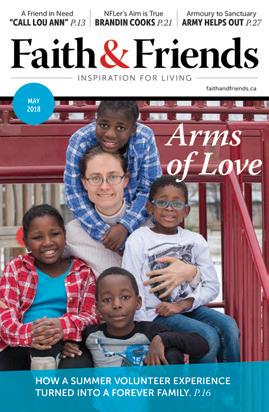


To help us celebrate this milestone in the life of Faith & Friends, we’re asking past editors, current writers and YOU, our readers, to tell us what articles have impacted them. If any article has spoken to you or changed how you thought of life and faith, we want to hear about it. Write or email us.

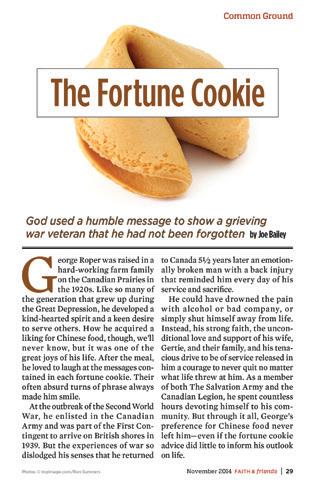 by
by
George Roper was raised in a hard-working farm family on the Canadian Prairies in the 1920s. Like so many of the generation that grew up during the Great Depression, he developed a kindhearted spirit and a keen desire to serve others. How he acquired a liking for Chinese food, though, we’ll never know, but it was one of the great joys of his life. After the meal, he loved to laugh at the messages contained in each fortune cookie. Their often absurd turns of phrase always made him smile.

At the outbreak of the Second World War, he enlisted in the Canadian Army and was part of the First Contingent to arrive on British shores in 1939. But the experiences of war so dislodged his senses that he returned
The first article was suggested by funnyman, humorist and public speaker Phil Callaway:
“Often a single phrase or a stirring story can offer much-needed perspective,” he says. “In the November 2014 Faith & Friends , I encountered both. We were facing uncertainty on a number of fronts when my wife pointed me to the article. The unlikely message found in a fortune cookie ( ‘May God hold you in the palm of His hands.‘) reminded us that we have a mansion builder who will hold us tight wherever we are in life.”
God used a humble message to show a grieving war veteran that he had not been forgotten.
Joe Bailey
to Canada 5½ years later an emotionally broken man with a back injury that reminded him every day of his service and sacrifice. He could have drowned the pain with alcohol or bad company, or simply shut himself away from life. Instead, his strong faith, the unconditional love and support of his wife, Gertie, and their family, and his tenacious drive to be of service released in him a courage to never quit no matter what life threw at him. As a member of both The Salvation Army and the Canadian Legion, he spent countless hours devoting himself to his community. But through it all, George’s preference for Chinese food never left him—even if the fortune cookie advice did little to inform his outlook on life.

On September 6, 2011, his wife passed away in the same month that they would have celebrated their 72nd wedding anniversary.
Apart from his service in the war, they had been constant companions. During the last years of his wife’s life at their nursing home, they could be seen sitting side by side in their wheelchairs, holding hands and watching a hockey game on TV.
George missed her terribly but his family refused to let him retreat into a chasm of grief. Even a little pup named Shadow made a contribution. Despite George’s advancing years, he remained alert and revelled in lighthearted bantering with the appreciative nursing home staff.
On August 31, 2013, George’s youngest daughter, Mary, ordered in. As old as he was, George still had a passion for Chinese food. When supper was done, they opened up their cookies and read the fortunes. Most messages are just fun to read without any serious content that one could build a life on. However, on this day, the contents of George’s fortune cookie left them in awe.

Never before had they or anyone else read words such as were in that fortune cookie.
“May God hold you in the palm of His hand,” it read.
Two years earlier to the very week, George had said a last goodbye to the wife he loved, and he still missed her deeply. Considering that there are approximately three billion fortune cookies made each year worldwide, the mathematical


improbabilities that this particular one would find its way into the hands of a grieving widower seem astronomically remote.
George passed away weeks later, one day shy of his 99th birthday. But in those final days, God had creatively found a way to show George that he had not— and had never—been forgotten. And He’d chosen a humble fortune cookie to do it with.
Moses. The very mention of his name brings to mind
God’s awe-inspiring power. We still talk about God appearing to Moses in a burning bush, the 10 plagues Moses called down upon Egypt, the parting of the Red Sea and the freeing of the Israelites. God Himself said about Moses, “He has proved to be reliable with all my household” (Numbers 12:7 Common English Bible).
But Moses wasn’t always a mighty hero.
Certainly, Moses started out life well. Rescued from drowning in the River Nile by the daughter of Pharaoh, Moses grew up in a palace, privileged and favoured (see Exodus 2:1-10).
But when Moses killed an Egyptian he saw abusing an Israelite slave, someone snitched to Pharaoh, who sought revenge. Moses then fled into the wilderness of Midian (present-day Saudi Arabia). There, he married a Midianite priest’s
daughter and lived as a lowly shepherd. Decades later, God appeared to Moses in a burning bush and said that He’d chosen him to rescue the Israelites from slavery in Egypt. Moses argued, “Who am I, that I should do this?” He even begged God to send someone else in his place. What a coward.
So why did God choose Bad Boy Moses and change him into one of Israel’s greatest heroes?
After much reassurance on God’s part, Moses finally agreed to travel back to Egypt. With his brother, Aaron, as his spokesperson, Moses confronted Pharaoh, boldly declaring, “This is what the Lord, the God of Israel, says, ‘Let My people go’ ” (Exodus 5:1).
When Pharaoh refused, Moses performed one miracle after another and called down 10 horrible plagues on the Egyptians. After his eldest son lay dead in his bed, Pharaoh relented.
The Israelites set out to their new
land, with Moses in the lead. As the Bible tells us in Exodus 14, when Pharaoh changed his mind and sent soldiers after them, Moses held his staff over the Red Sea and the waters parted. The Israelites walked to safety on dry ground. Moses held his staff out again and the sea returned, drowning every Egyptian soldier.
How did Moses go from a cringing wimp, telling God, “I’m not Your man,” to a tough, miracle-working leader? Three words: Moses met God.
In the burning bush on Mount Sanai and in his tent face-to-face (see Exodus 33:11), God spoke with Moses. Each time Moses listened to the Lord’s voice and obeyed Him, his heart grew in courage.
God’s love and power permeated Moses until his past and his fears no longer ruled him. Moses moved forward in the strength and favour of God and became a stalwart, wise leader.
Nice story, you might think. But how does it affect me?
Similar to Moses, when we meet God, He frees us from our past, our fears and our slavery to sin through the sacrifice of Jesus. And the more we obey His voice, the more we grow in boldness. The easier it is to believe God has a path marked out for us. A path of victory.

But as Christians, we have it far better than Moses did. We don’t need a burning bush or a special tent to bond with God. By faith in Jesus, we have God’s Holy Spirit in us every moment. He never leaves us (see Matthew 28:20).
We can meet with God in prayer while we stand in line for a coffee, drive to appointments, work out or do chores. We hear God speak in our hearts and through His Word, the Bible. As we listen to His Spirit and follow Him, we, like Moses, can go from cowardly to courageous. And that’s miraculous.
Read Exodus 2-20
• Who: An Israelite prophet who emancipated God’s people from slavery in Egypt
• When: Around 1520-1400 BC
• Where: Canaan (modern-day Israel), Saudi Arabia and Egypt
JESUS REVOLUTION IS MORE THAN A MOVIE; IT’S AN INVITATION TO EXPERIENCE REVIVAL.
 by Shannon Mischuk
by Shannon Mischuk
In the late 1960s, young Greg
Laurie (Joel Courtney, The Kissing Booth) is searching for all the right things in all the wrong places, until he meets Lonnie Frisbee (Jonathan Roumie, The Chosen), a charismatic, hippie street preacher who became an integral part of the Vineyard Movement.
Pastor Chuck Smith (Kelsey Grammer, Frasier), who leads a “respectable” if languishing church, is unimpressed.
“I think these kids need help,” says his wife.
“What they need is a bath,” retorts
Pastor Chuck.
“You’re passing judgment on people you know nothing about,” argues their daughter. “Maybe that’s why your church is so empty.”
At first Pastor Chuck is cynical, but with Lonnie, he opens the doors of his church to an unexpected revival of radical and newfound love, leading to what TIME magazine dubbed the Jesus Revolution.
While I knew it would be a great film, now in theatres, I wasn’t expecting it to impact me the way it did.
While watching Jesus Revolution, core memories from my childhood came flooding to me. The incredible music, cinematography, set and costume design placed me back in North Vancouver, B.C., in 1972, where I grew up.
After I was born, my parents committed their lives to Christ and were radically converted. The church we attended in our neighbourhood of Lynn Valley was profoundly impacted by the Jesus Movement, as were many churches throughout the province, and eventually, across the country.
The music in my church changed as drums and electric guitars made their way to the stage. It wasn’t just the worship sets that changed— though I did appreciate the change it brought to my parents’ record collection (many of the bands and artists that came out of this time period became leaders within the Jesus Movement: Barrie McGuire, Second Chapter of Acts, Keith Green)—it was something much deeper.
The people sitting next to me changed.
I could look down the pew any Sunday and see leather-clad bikers sitting next to an older man in a suit and tie, sitting next to a longhaired 20-something, sitting next to me. This eclectic community began to do life together. We attended tent meetings, camped over weekends at outdoor music festivals, handed out
gospel tracts and ran a coffee house out of our church basement. We truly were a family, brought together by a passion to reach a generation that was seeking something substantial. Something real. Something that would last. Something true.
The Jesus Movement was a revival rooted in love. That pure love is what changed lives—and drew me closer to Jesus.
During my rebellious years, it was these childhood experiences that pulled me back in. I was reminded of God’s goodness and grace, and He reminded me of His unconditional love.
Jesus Revolution is based on the book of the same title by Pastor Greg Laurie, founder of Harvest Christian Fellowship, a retelling of his firsthand conversion experience with Lonnie Frisbee and Pastor Chuck Smith. An impressive film that does a great job of detailing the incredible spiritual awakening of the 1960s and ’70s and how God moved during that time, it absolutely has implications for us today.
• What could a revival today look like?
• Who are the “outcasts” of today?
• How can we show them they are loved?
Jesus Revolution will remind those who lived it of how God’s Word swept through nations, changing the path for an entire generation of hippies, outcasts and truth-seekers, and it will hopefully inspire people to pray, “Lord, do it again.”
NBA POWER FORWARD TAUREAN PRINCE OF THE MINNESOTA TIMBERWOLVES HAS AN ATTITUDE OF GRATITUDE, ESPECIALLY WHERE THE SALVATION ARMY IS CONCERNED.
 by Jayne Thurber-Smith
by Jayne Thurber-Smith
Alley-oop!
Taurean Prince makes a run for the net

RATHER THAN JUST celebrating Father’s Day last year by relaxing and being waited on by his own kids, Taurean Prince of the Minnesota Timberwolves dropped by The Salvation Army of North Texas to wait on others.

As onlookers stared star-struck, Taurean handed out much-appreciated hygiene products along with autographs, participated in selfies and dished up dinner. His huge presence, big hugs and wide grin lit up the room. At six feet seven inches tall, the basketball star squatted down to lace and unlace sneakers to make sure people in need of shoes got just the right fit.
When Taurean left the donations area to help fill food trays, one man came by lamenting that he couldn’t find any size 13 shoes. Taurean then took his very own sneakers off and traded them for the man’s sandals!
“That’s doing the most good for sure!” a Salvation Army bystander laughed in awe, referring to The Salvation Army’s slogan in the United States.
“Giving is the number one rule to receiving,” the 29-year-old says. “You can’t really receive a lot of the blessings you pray for or strive for unless you have that sacrifice of being able to give. I want to return the favours that were done for me.”
He recalls a brief time in his youth when he and his father were homeless and found safe refuge at a Salvation Army shelter in San Angelo, Texas. Taurean states that the Army saved his life.
“You never know what would’ve happened otherwise,” he says. “That night when me and my father went to enrol, if they wouldn’t have given
At an event put on by The Salvation Army of North Texas, Taurean waits on others
us a spot? You just never know.”
He very much appreciates The Salvation Army’s continuing contribution to the community, all these years later.
“It’s a great thing to give to those in bad situations, and to be able to supply those in need with shelter and food,” he says. “The help they are providing shows what a great organization they are. And a big shout out to the people who donate to allow The Salvation Army to do the things they do.”
Taurean recorded an hour of his

Salvation Army visit and shared it on his Instagram with the caption “I’m the Example.”
“Wanting to help others is a part of who I am,” he says. “That’s all I’m here to do—try and be a blessing for them. I want to share what I went through, my experiences in the past. It gives the kids at the shelter that motivation factor, and the ambition that they can do it as well. I tell them to just keep pushing. I know it’s cliché to say, but it’s about putting out positivity. You’ll receive it back.”
“The help they are providing shows what a great organization The Salvation Army is.”
TAUREAN PRINCEPhoto : Courtesy of Minnesota Timberwolves
Feeding the Hungry Taurean knows that people can hear the salvation story much better when their stomachs aren’t growling
Part of Taurean’s experiences the past few years have included playing for various NBA teams until he landed in Minnesota in 2021. Shortly after his Father’s Day visit to The Salvation Army, he signed on with the Timberwolves for another two years.

“Each NBA team is unique in different ways,” he comments, “each
As Jesus stooped to wash His disciples’ feet, Taurean also stoops down to care for someone in need
city, fan base and owners. This team is unique. I like that there are a lot of veterans here. Being able to learn from their experience helps our players out. Everybody gets along with everybody else in the locker room. It’s probably one of the few groups I’ve been in that a lot of us hang out together outside the stadium. There’s always chemistry on the court when you get along off the
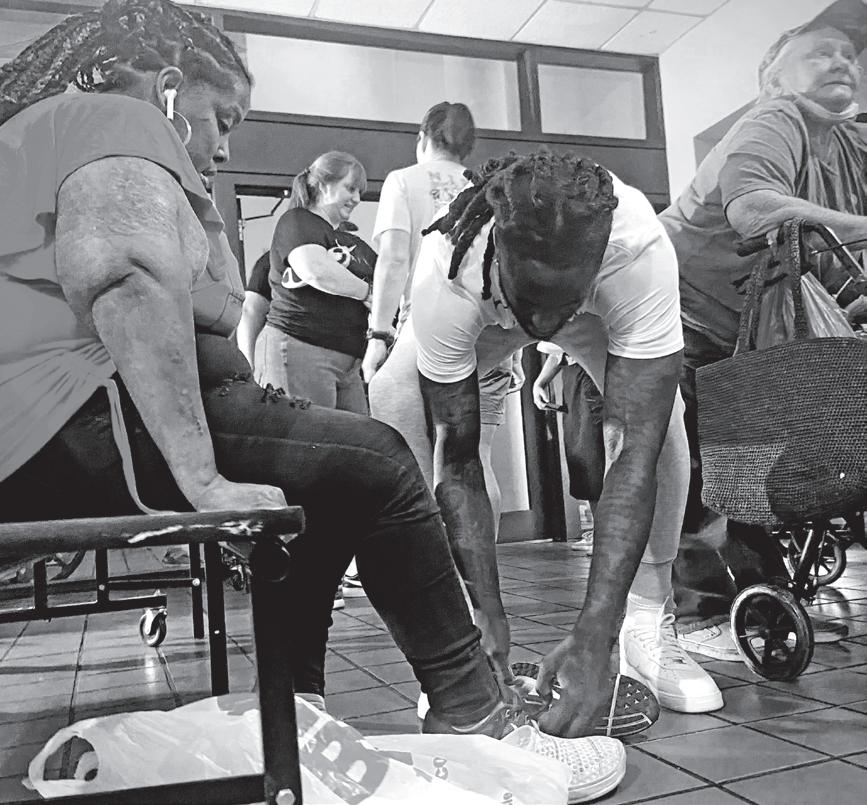
court, which makes playing basketball with each other easy.”
The Timberwolves vastly outperformed the public’s expectations last season. They clawed their way into the playoffs by defeating the Los Angeles Clippers in the play-in round, then held their own against the favoured Memphis Grizzlies. They took the Grizzlies to six out of a possible seven games, many of which could have gone either way.
“We wanted to capitalize on all opportunities,” Taurean comments. “We knew that it was time to go out there and show what we could do. It takes commitment, consistency and having belief in yourself more than anyone else does. We know there are certain teammates who need to get the ball to give us the best chance to win, and we buy into that.”
He looks forward to building on what they’ve already achieved.
“I’m super excited about this season,” he says. “Obviously, our goal is to get further than last season, getting into the gym and connecting the dots. Every team is different year to year, and I’m looking forward to being together with the guys and making it work.”
While Taurean got off to a great start this season, he unfortunately ran into ankle problems, and when he tried to come back too soon, he found himself back on the injury list, with no indication as to recovery time. As for the Timberwolves, the spring saw them in position to make the playoffs.
“Anything is possible,” smiles Taurean.
He wears number 12 on the court because he was honoured to be selected the 12th overall pick in the 2016 NBA draft. One of Taurean’s Instagram posts tells how unlikely a possibility that seemed when he was a kid on the street.
“I shouldn’t be here. How is this possible? It’s simple—gratitude. Everything was stacked against me as a kid—poor, homeless, forgotten, there was no clear path. I didn’t even start until my junior year of high school. No Division 1 colleges wanted me, and yet here I am. Effort is one hundred times more important than any excuse. I take nothing for granted. I shouldn’t be here, but here I am.”

I MADE A PROMISE TO GOD, BUT WOULD I LIVE LONG ENOUGH TO DELIVER ON IT?
by Joseph Lauren“When my cell gets cracked open, I’m going to come over to yours and kill you!” Frankie said in a voice loud enough for everyone in the cellblock to hear.
As a fellow inmate at Kingston Penitentiary in Ontario, I knew that this wasn’t an idle threat. I had been handing out dinner trays and one word had led to another. Evidently, whatever I had told him had crossed the line of acceptable insults at a maximum-security prison.
The entire range had gone silent. Because of his status inside and whatever code he lived by, everyone knew that Frankie was now obligated to at least try to kill me.
Once our cell doors were opened for shower time in the next few minutes, I faced the reality that nothing good was going to happen to me. I would either win the fight against this younger and larger prisoner, resulting in more prison time being added to a sentence that would keep me away from my

children, or, more likely, I would be severely injured, maimed or even killed.
Kingston Penitentiary was the last place I ever thought I’d be when I started my first day as an articling student waiting for a tour of a large downtown law firm in Toronto.
While I was waiting, I saw another summer student wearing Formula One white leather driving shoes. I asked him what he was doing and he mentioned that he was having a car delivered that he had purchased from a deal he was working on. Now, I knew that he couldn’t afford that type of car on the salary near what I was about to make
so I took that to mean he’d made money on insider trading. I called my best friend, who was working at another firm, and told him what I had seen, and we both decided to try it.
Within two years, we were making millions of dollars. By then, I’d moved to New York City, trading stock full-time and setting up accounts all around the world.
If I had never seen that student, I would never have gotten into it. My plan was always to attend law school, finish at the top of my class, and then work at a prestigious downtown firm. And that’s the path I was on … until that day.
But that conversation led down a slippery slope to a decade-anda-half career of insider trading in Canada and the United States, churning through tens of millions of dollars and the tragic death of my best friend and co-accused, who committed suicide the day before we were to fly to New York City to plead guilty. Career, money, relationships, all went up like smoke. It’s something I regret to this day.
But on that day in Kingston Penitentiary, before my cell was cracked open, I realized my life was about to end in the next five minutes.

I had never been much of a religious person but, faced with a dark reality, I prayed like I had never prayed before. Being a lawyer, my prayer became more of a negotiation with God than one for help.

“God,” I said, “if You could help me get through this, I promise to take some good from the bad of my experiences, help other people and make an unselfish act of the rest of my life if You could get me back to my children unharmed.”
Immediately after I whispered that promise out loud, I heard an explosion of metal—doors opening—followed by the sound of
feet stomping fast and hard toward my cell. I prepared myself for the fight-to-be when a group of correctional officers ran frantically past my cell.
After I caught my breath, I pushed my face against my cell’s bars to look down the hall to see what was going on. As I did, I saw two correctional officers with an inmate strapped to a stretcher. It was Frankie, the inmate who had threatened to kill me and who would have tried to in the next few minutes. He’d had a seizure! The guards carried him away from my life forever, never to be seen again. My life had been saved.
Joseph Lauren today. "If I can help even one person, out of the thousands of people who have heard me speak, it will be worth it"
From the moment I made that promise to God, to do things to help others, events occurred at a dizzying pace. Within a week, I had a parole suspension hearing—the chaplain told me I was only the second person in five years to win a judgment—and less than a week after that, I was back in Toronto playing with my children.
I kept my promise. I helped create a documentary on my life, Collared, on the prevention of white-collar crime through a focus on its unin-
neighbourhoods.
This is where The Salvation Army comes in through their system of halfway houses and referrals of those who have just been released from prison. It’s an incredibly vibrant organization that deals with people no one else cares about.
Juliane Martin, a chaplain with The Salvation Army at Bunton Lodge/WP Archibald Centre in Toronto, a halfway facility for ex-offenders, is one of those caring people. As a facilitator and administrator, she meets with
tended victims. I’ve spoken to schools and church groups, corporations and professional bodies. My default position is that if I can help even one person, out of the thousands of people who have heard me speak, it will be worth it.
Through my talks, I was referred to Restorative Justice Housing Ontario, which is a charity I work for as its founding program director. We assist former prisoners by providing safe, affordable housing. This gives them the stable foundation they need to become positive members of their communities. It also leads to lower rates of re-offence and safer
our potential clients and ensures they are committed to reform. She makes my life a lot easier.
I don’t know how we would function without her and other Salvation Army pastors.
I could be bitter about my life, everything that led to my incarceration and what I lost, but I’m very appreciative about where it’s led me, who I have interacted with and how I’ve been able to give back to different people and society to try to make amends. I can’t change what happened, but I can at least try to continue to take some good from the bad, and, in so doing, keep the promise I made to God.
My life was about to end in the next five minutes.
JOSEPH LAUREN
In theatres this May, The Little Mermaid is a live-action adaptation of Disney’s 1989 animated film of the same name, which is based on a fairy tale written by Hans Christian Andersen in 1837. The 1989 movie is probably bestknown for its music, and producer Lin-Manuel Miranda (Hamilton) confirmed that all of the original songs are included in the remake, as well as some new ones.
The film tells the story of a young mermaid princess named Ariel

(Halle Bailey, The Color Purple), who is fascinated with the human world. Ariel’s father, King Triton (Javier Bardem, Dune), is protective of his underwater kingdom and especially of his seven musically inclined daughters. When Triton discovers Ariel’s secret collection of artifacts from the human world, he warns her that human beings are dangerous and demands that she remain under the water, where she’ll be safe.
Of course, Ariel doesn’t listen. She is drawn to the surface, where she witnesses a boat being shipwrecked,
In The Little Mermaid, will Ariel regret the trade she made?Illustration: Courtesy of Walt Disney Pictures
its passengers thrown into the sea. She rescues one of them, a handsome prince named Eric (Jonah Hauer-King, World on Fire). Ariel falls in love with him and vows to find a way to be with Eric on land. Triton is livid when he discovers Ariel’s plans.
Desperate to make her dream of living on land a reality, Ariel makes a deal with Ursula (Melissa McCarthy, God’s Favorite Idiot), the evil sea witch who is jealous of King Triton’s power. She gives the witch her most valuable possession: her beautiful voice. In exchange, Ursula casts a spell that changes Ariel’s mermaid tail into human legs, but their trade has a catch that could put everything—and everyone—Ariel values in jeopardy.
Ariel, despite being a mermaid, defiantly insists that her true home is on dry land among the humans. She cherishes her collection of items from the human world and risks everything to become a part of it. Each of us was born on earth, but if we are Christians, the Bible says our citizenship is in heaven (see
Philippians 3:20). That is our true home. Despite this truth, too many of us are too comfortable here in the human world. Like Ariel, we collect things and can become distracted by material trappings. We might even chase something less tangible, such as fame and popularity.
The things we collect in this world can distract us from our true calling: telling other people that God wants us to be part of His heavenly world for eternity. But unlike Ariel’s deal with the sea witch, there’s no catch in God’s offer. God made humans to live in relationship with Him, and in the beginning, that’s how it was. But Adam and Eve sinned, and that separated humans from God. But God still had a plan. He loves us so much that He sacrificed the most precious thing He had—His Son, Jesus—so we could once again become part of His world.
Not only that, God wants to be the centre of our world while we’re still here on earth. He’s always with us, and He cares about everything that happens to us. If we invite God into our lives in this world, someday, He will welcome us into His heavenly world for eternity.
Ariel, despite being a mermaid, defiantly insists that her true home is on dry land among the humans. DIANE STARK

TIME 1 hr 40 min MAKES 2 servings SERVE WITH mashed potatoes and/or salad
2 turkey legs
5 ml (1 tsp) salt or vegetable seasoning salt
2 ml (½ tsp) pepper

5 ml (1 tsp) paprika
15 ml (1 tbsp) olive oil
15 ml (1 tbsp) Worcestershire sauce
5 ml (1 tsp) fresh rosemary, sprigs removed
5 ml (1 tsp) fresh thyme, sprigs removed

1. Preheat oven to 175 C (350 F).
2. Mix all spices together in bowl and rub over turkey legs.
3. Put turkey legs and spice mix into a small roasting pan. Place on middle rack of oven, covered with aluminum foil, and cook for one hour. Remove foil, flip turkey and cook for an additional 30 minutes.
4. After the turkey has cooked for a total of 1 hour and 30 minutes, broil on each side for 1 minute. Ensure that turkey is golden brown on the outside and has reached an internal temperature of 74 C (165 F).
TIME 5 min MAKES 8 servings SERVE WITH tea or coffee
1 cup all natural smooth peanut butter
125 ml (½ cup) rolled oats
60 ml (¼ cup) unsweetened shredded coconut plus 30 ml (2 tbsp) for garnish
15 ml (1 tbsp) chia seeds
30 ml (2 tbsp) honey or maple syrup
60 ml (¼ cup) mini chocolate chips
1. With the exception of the 30 ml (2 tbsp) of shredded coconut, place all ingredients in a bowl.
2. Line a plate with parchment paper.
3. Mix ingredients together in bowl and form into balls. There should be 15-16. Roll balls in the reserved coconut.
4. Place in fridge for 20 minutes and then transfer to an airtight bowl. They will keep up to a week in the refrigerator or three months in the freezer.
Fill in the grid so that every row, every column and every 3 × 3 box contains the digits 1 through 9.
1. Which Los Angeles Lakers player now holds the alltime NBA scoring record?

2. In Shakespeare’s play, what country is Hamlet the prince of?
3. What month’s birthstones are pearl, alexandrite and moonstone?

For our twins’ second birthday, I wanted to create a bit of food fun. Think of all the celebrations you’ve attended. The food is always on display and it can be a great way to add colour and magic to a party. With thrifting, I always have an idea of what I am looking for but am open to finding something different. I went to my local Salvation Army thrift store with the plan of picking up a few items I could use for the food table. Here’s how I created a thrifted party table:

These are something you can always find at the thrift store. How to use them? I made Rice Krispies treats in the shape of a “2” and then dipped them in pink chocolate (they were a hit). With a butterfly cookie cutter, I made little sandwiches.


When hosting your next party, consider the cuisine as part of the décor.

Everyone needs one in their kitchen. I used watermelon and honeydew for a bright display. The kids loved the little balls and they vanished quickly.

Who doesn’t love small desserts? At my local Salvation Army thrift store, I discovered a mini muffin pan and used it to make tiny cupcakes. These are great for a party because you can make them ahead of time.


Adding colour, shapes and bite-sized treats can be so easy! Remember to check your local Salvation Army thrift store, as a lot of party supplies are donated when they are no longer needed.

Families across the country face empty cupboards and fridges daily.
The Salvation Army believes everyone is worthy of being fed, lifted and loved.
